Here are my favorite poems about flowers categorized:
- Famous poems about flowers
- Short poems about flowers
- Poems on flowers
- Inspirational flower poems
- Flower poems about life
- Sad poems about flowers
So if you want the best poems about flowers, then you’re in the right place.
Read on and enjoy!
- 19 Mesmerizing Poems About Bluebells
- 31 Enchanting Poems About Cherry Blossoms
- 21 Intoxicating Poems About Lavender
- 63 Satisfying Poems About Weeds
- 163 Free-Spirited Poems About Wildflowers
- 69 Sublime Poems About Poppy Flowers
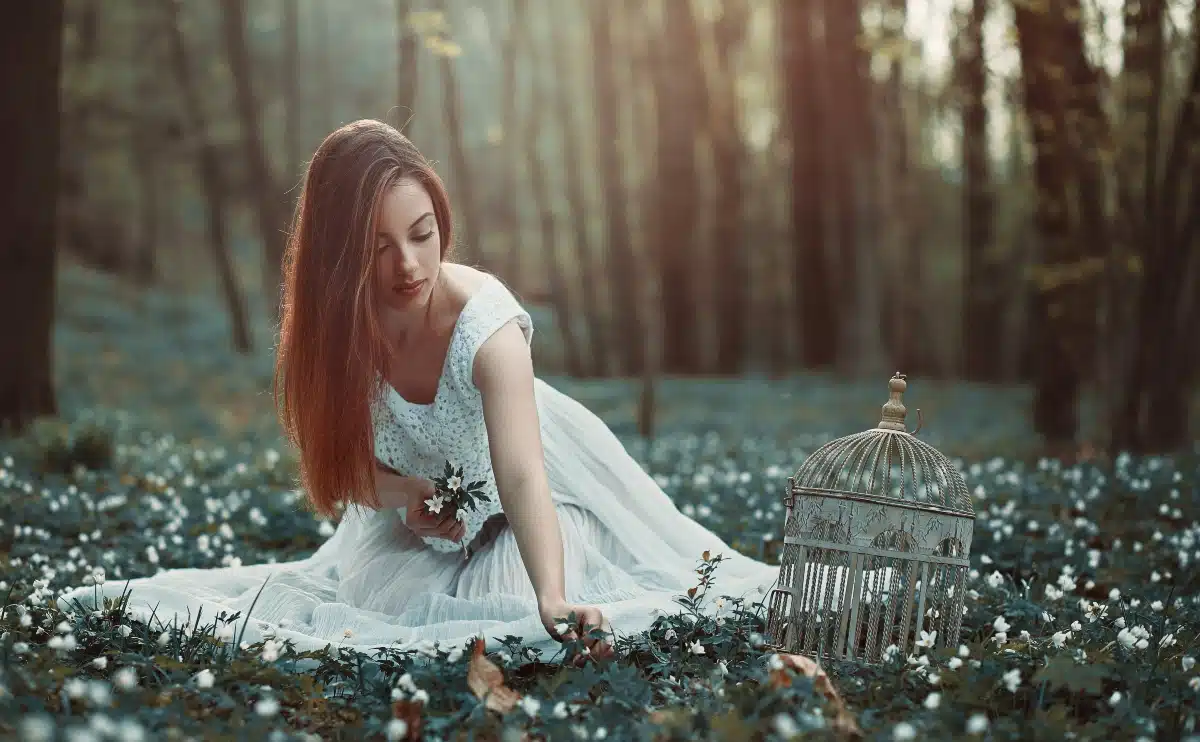
Exquisite Poems About Flowers
Immerse yourself in the beauty and symbolism of flowers with this collection of the best poems about flowers.
From famous works that celebrate the vibrant colors and sweet fragrances of blossoms to poignant pieces that reflect on the fleeting nature of life and beauty, these poems offer a glimpse into the many ways in which flowers can inspire and move us.
Featuring works by some of the greatest poets of all time, as well as hidden gems waiting to be discovered, this collection showcases the power of flowers to evoke emotion and stir the soul.
Whether you’re seeking solace in the delicate petals of a bloom or simply looking to appreciate the natural world around you, these poems are sure to delight and inspire.
Let’s get into it!
My #1 Favorite Poem About Flowers
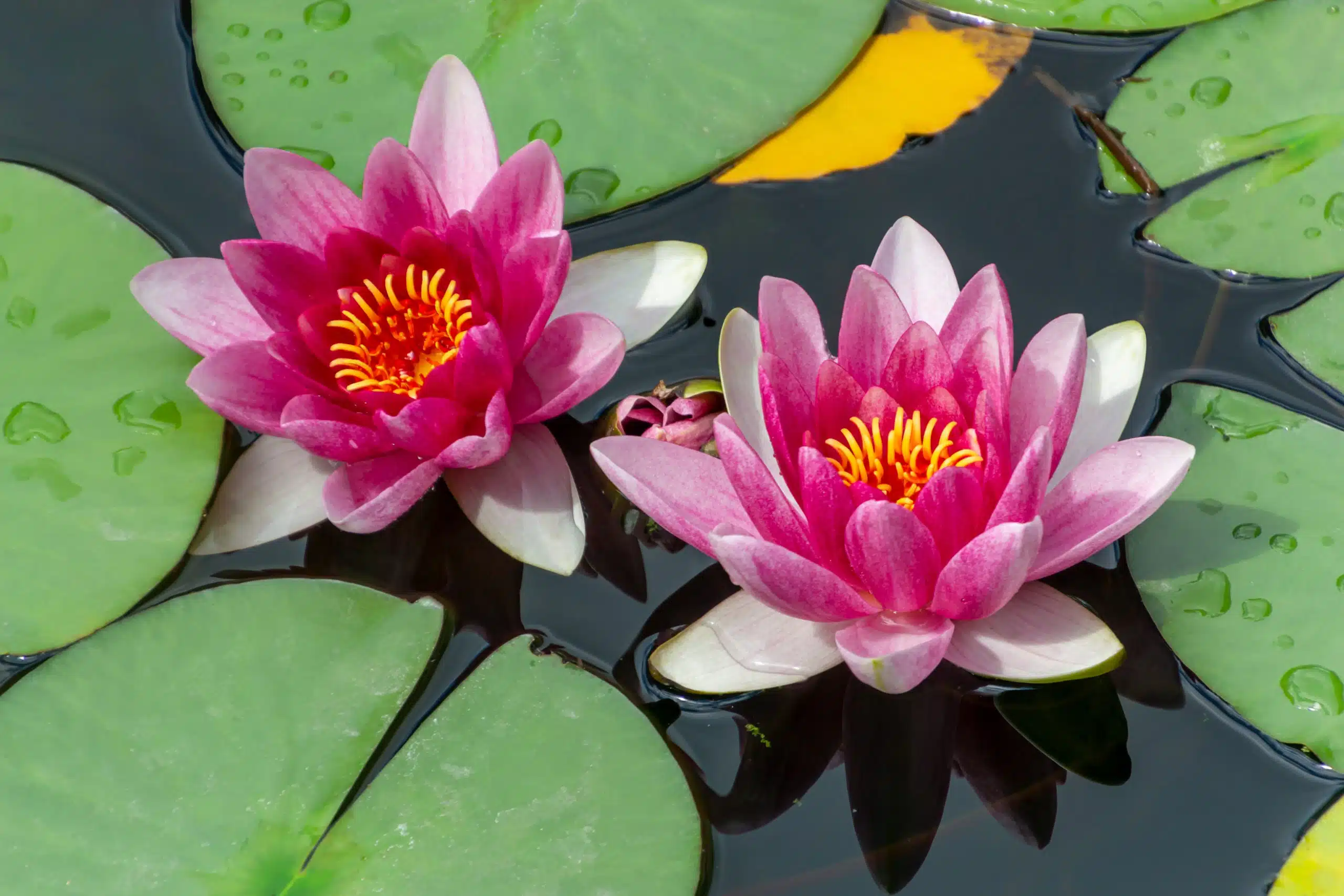
“Water-Lilies” by Felicia Hemans
Come away, elves!—while the dew is sweet,
Come to the dingles where fairies meet!
Know that the lilies have spread their bells
O’er all the pools in our forest dells;
Stilly and lightly their vases rest
On the quivering sleep of the water’s breast,
Catching the sunshine through leaves that throw
To their scented bosoms an emerald glow;
And a star from the depth of each pearly cup,
A golden star unto heaven looks up,
As if seeking its kindred where bright they lie,
Set in the blue of the summer sky.
Come away! Under arching boughs we’ll float,
Making those urns each a fairy boat;
We’ll row them with reeds o’er the fountains free,
And a tall flag-leaf shall our streamer be;
And we’ll send out wild music so sweet and low,
It shall seem from the bright flower’s heart to flow,
As if ’twere a breeze with a flute’s low sigh,
Or water-drops train’d into melody.
Come away! for the midsummer sun grows strong,
And the life of the lily may not be long.
Famous Poems About Flowers
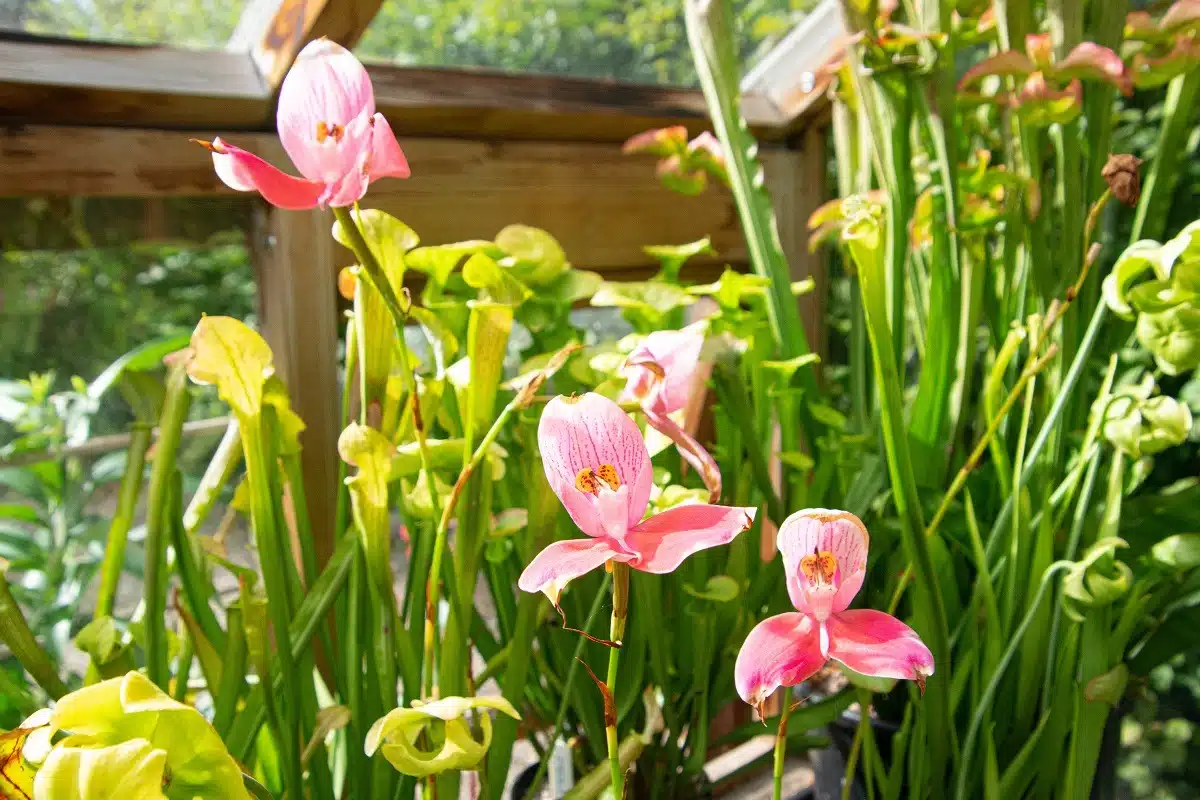
“Rose Pogonias” by Robert Frost
A saturated meadow,
Sun-shaped and jewel-small,
A circle scarcely wider
Than the trees around were tall;
Where winds were quite excluded,
And the air was stifling sweet
With the breath of many flowers,—
A temple of the heat.
There we bowed us in the burning,
As the sun’s right worship is,
To pick where none could miss them
A thousand orchises;
For though the grass was scattered,
Yet every second spear
Seemed tipped with wings of color,
That tinged the atmosphere.
We raised a simple prayer
Before we left the spot,
That in the general mowing
That place might be forgot;
Or if not all is favoured,
Obtain such grace of hours,
That none should mow the grass there
While so confused with flowers.
“Ah! Sunflower” by William Blake
Ah! sunflower, weary of time,
Who countest the steps of the sun,
Seeking after that sweet golden clime
Where the traveller’s journey is done;
Where the youth pined away with desire,
And the pale virgin shrouded in snow,
Arise from their graves and aspire;
Where my sunflower wishes to go.
“Apotheosis” by Emily Dickinson
Come slowly—Eden
Lips unused to Thee—
Bashful—sip thy Jessamines
As the fainting Bee—
Reaching late his flower,
Round her chamber hums—
Counts his nectars—
Enters—and is lost in Balms.
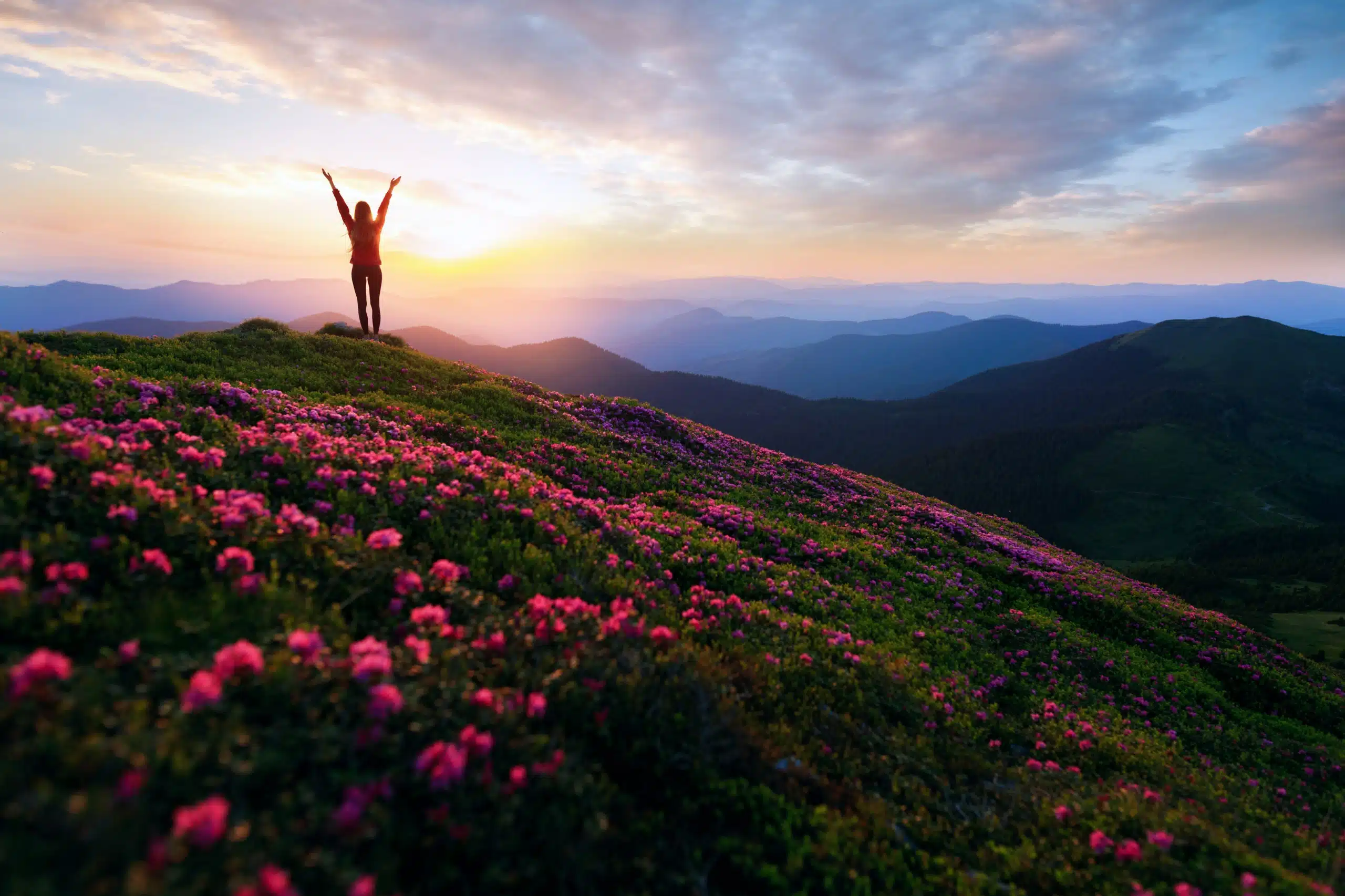
“Fairy Song” by John Keats
Shed no tear! O shed no tear!
The flower will bloom another year.
Weep no more! O, weep no more!
Young buds sleep in the root’s white core.
Dry your eyes! Oh! dry your eyes!
For I was taught in Paradise
To ease my breast of melodies—
Shed no tear.
Overhead! look overhead!
‘Mong the blossoms white and red—
Look up, look up. I flutter now
On this flush pomegranate bough.
See me! ’tis this silvery bell
Ever cures the good man’s ill.
Shed no tear! O, shed no tear!
The flowers will bloom another year.
Adieu, adieu—I fly, adieu,
I vanish in the heaven’s blue—
Adieu, adieu!
“Crowned” by Amy Lowell
You came to me bearing bright roses,
Red like the wine of your heart;
You twisted them into a garland
To set me aside from the mart.
Red roses to crown me your lover,
And I walked aureoled and apart.
Enslaved and encircled, I bore it,
Proud token of my gift to you.
The petals waned paler, and shriveled,
the thorns started through.
er thorns to proclaim me your lover,
A diadem woven with rue.
“In the Heart of a Rose” by George Marion McClellan
I will hide my soul and its mighty love
In the bosom of this rose,
And its dispensing breath will take
My love wherever it goes.
And perhaps she’ll pluck this very rose,
And, quick as blushes start,
Will breathe my hidden secret in
Her unsuspecting heart.
And there I will live in her embrace
And the realm of sweetness there,
Enamored with an ecstasy,
Of bliss beyond compare.
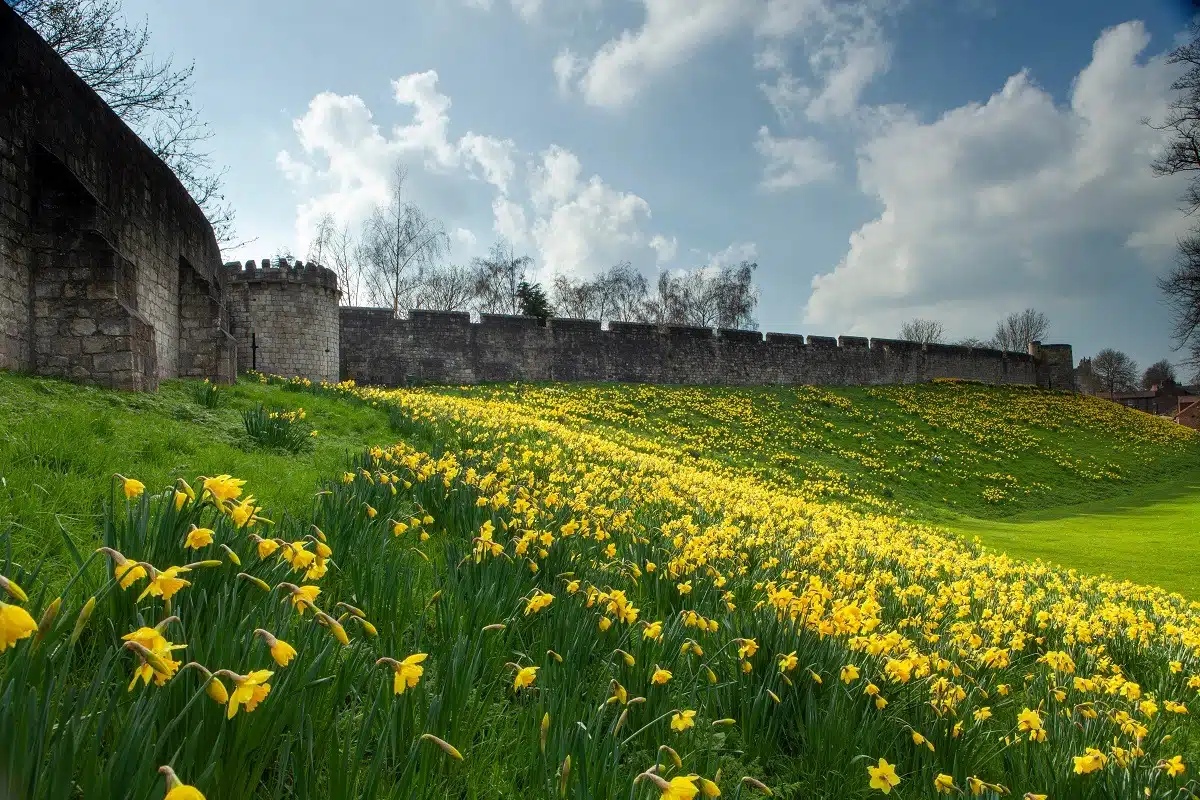
“I Wandered Lonely as a Cloud” by William Wordsworth
I wandered lonely as a Cloud
That floats on high o’er Vales and Hills,
When all at once I saw a crowd,
A host of golden Daffodils;
Beside the Lake, beneath the trees,
Fluttering and dancing in the breeze.
Continuous as the stars that shine
And twinkle on the Milky Way,
They stretched in never-ending line
Along the margin of a bay:
Ten thousand saw I at a glance,
Tossing their heads in sprightly dance.
The waves beside them danced, but they
Out-did the sparkling waves in glee:—
A Poet could not but be gay
In such a jocund company:
I gazed—and gazed—but little thought
What wealth the shew to me had brought:
For oft when on my couch I lie
In vacant or in pensive mood,
They flash upon that inward eye
Which is the bliss of solitude,
And then my heart with pleasure fills,
And dances with the Daffodils.
“Sea Poppies” by H. D.
Amber husk
fluted with gold,
fruit on the sand
marked with a rich grain,
treasure
spilled near the shrub-pines
to bleach on the boulders:
your stalk has caught root
among wet pebbles
and drift flung by the sea
and grated shells
and split conch-shells.
Beautiful, wide-spread,
fire upon leaf,
what meadow yields
so fragrant a leaf
as your bright leaf?
“Consider the Lilies of the Field” by Christina Rossetti
Flowers preach to us if we will hear:–
The rose saith in the dewy morn,
I am most fair;
Yet all my loveliness is born
Upon a thorn.
The poppy saith amid the corn:
Let but my scarlet head appear
And I am held in scorn;
Yet juice of subtle virtue lies
Within my cup of curious dyes.
The lilies say: Behold how we
Preach without words of purity.
The violets whisper from the shade
Which their own leaves have made:
Men scent our fragrance on the air,
Yet take no heed
Of humble lessons we would read.
But not alone the fairest flowers:
The merest grass
Along the roadside where we pass,
Lichen and moss and sturdy weed,
Tell of His love who sends the dew,
The rain and sunshine too,
To nourish one small seed.
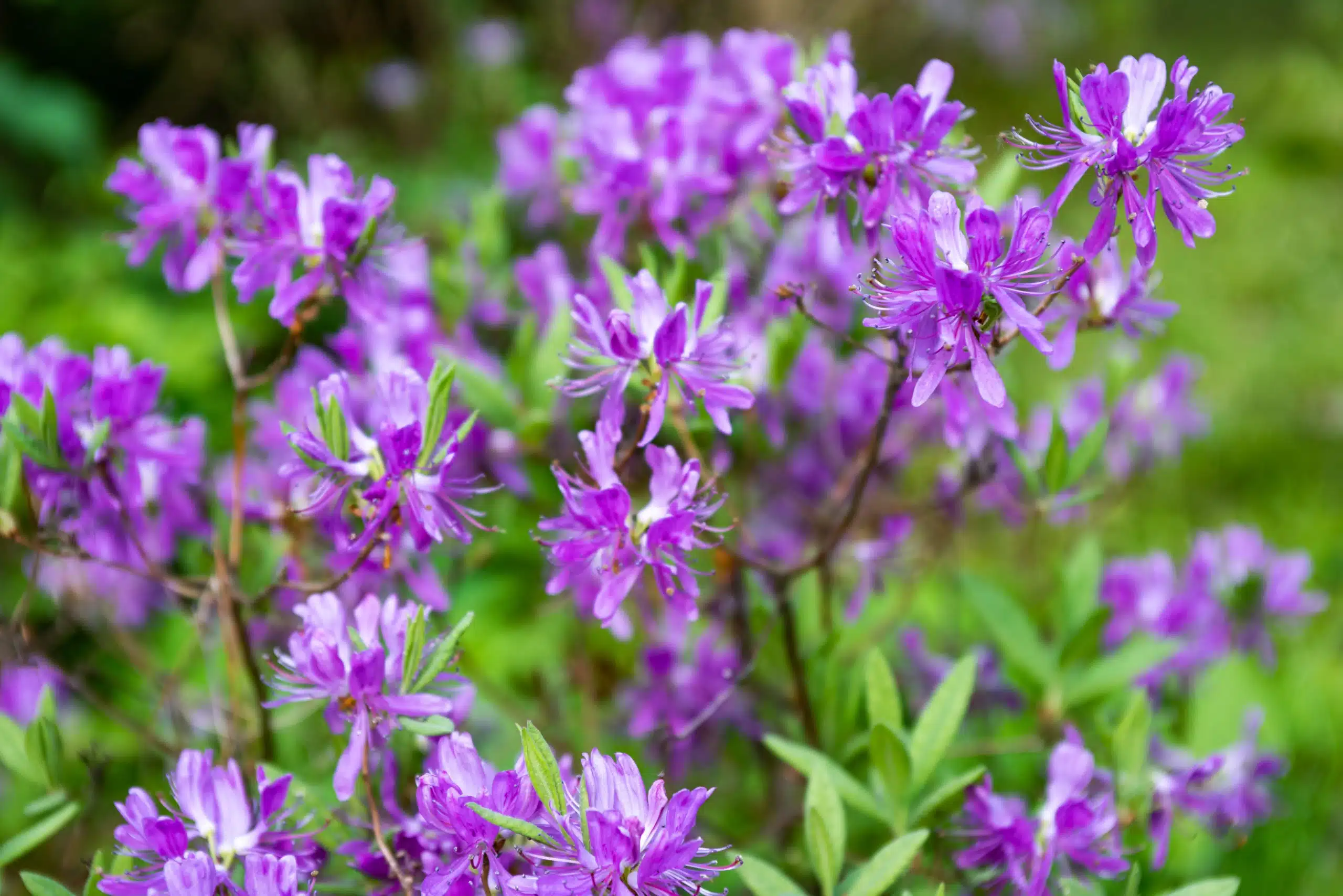
“The Rhodora” by Ralph Waldo Emerson
In May, when sea-winds pierced our solitudes,
I found the fresh Rhodora in the woods,
Spreading its leafless blooms in a damp nook,
To please the desert and the sluggish brook.
The purple petals fallen in the pool
Made the black water with their beauty gay;
Here might the red-bird come his plumes to cool,
And court the flower that cheapens his array.
Rhodora! if the sages ask thee why
This charm is wasted on the earth and sky,
Tell them, dear, that, if eyes were made for seeing,
Then beauty is its own excuse for Being;
Why thou wert there, O rival of the rose!
I never thought to ask; I never knew;
But in my simple ignorance suppose
The self-same power that brought me there, brought you.
“My Pretty Rose Tree” by William Blake
A flower was offered to me,
Such a flower as May never bore;
But I said “I’ve a pretty rose tree,”
And I passed the sweet flower o’er.
Then I went to my pretty rose tree,
To tend her by day and by night;
But my rose turned away with jealousy,
And her thorns were my only delight.
“With a Flower” by Emily Dickinson
I hide myself within my flower,
That wearing on your breast,
You, unsuspecting, wear me too —
And angels know the rest.
I hide myself within my flower,
That, fading from your vase,
You, unsuspecting, feel for me
Almost a loneliness.
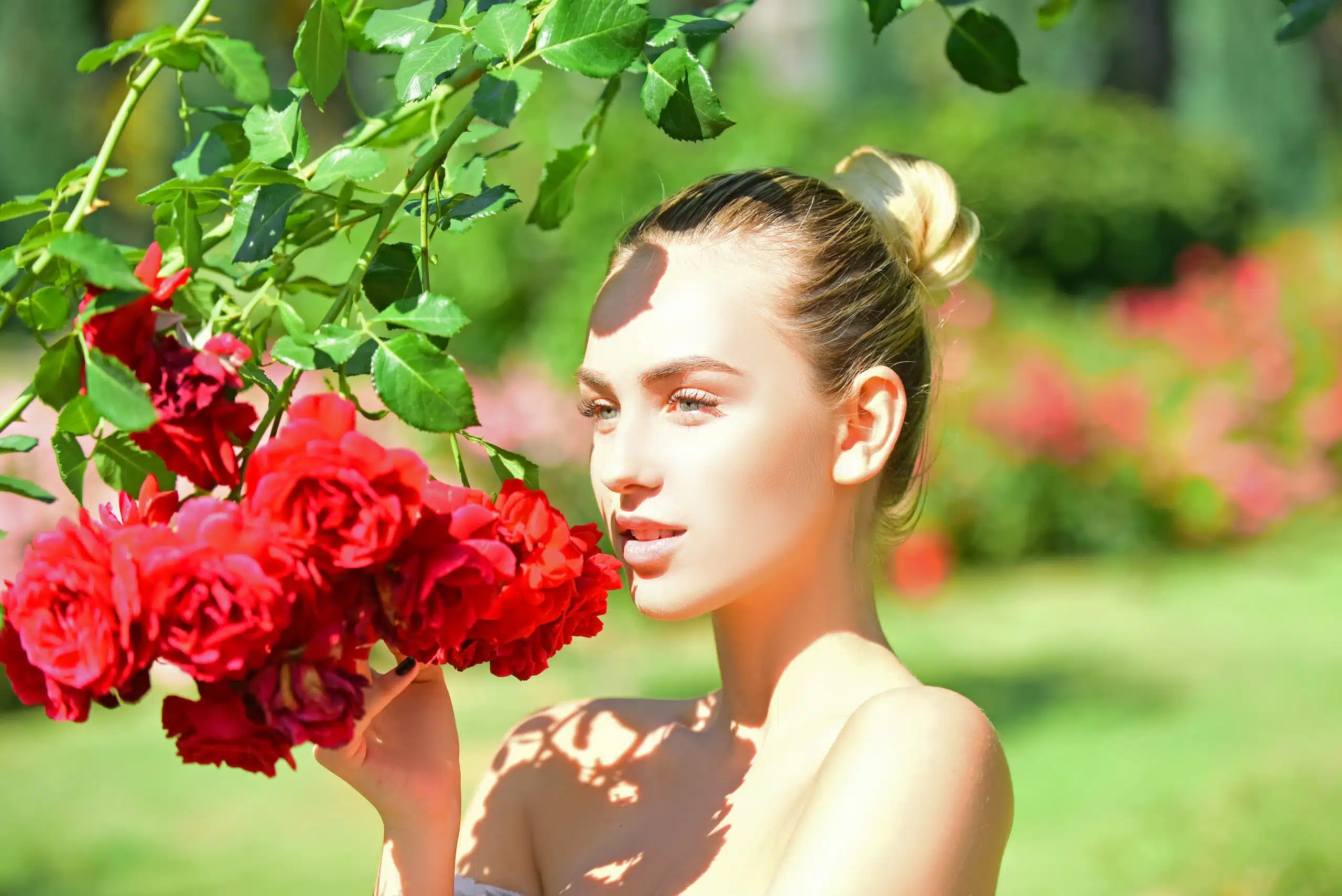
“The Rose” by Sappho (John Myers O’Hara, Translator)
If it pleased the whim of Zeus in an idle
Hour to choose a king for the flowers, he surely
Would have crowned the rose for its regal beauty,
Deeming it peerless;
By its grace is valley and hill embellished,
Earth is made a shrine for the lover’s ardor;
Dear it is to flowers as the charm of lovely
Eyes are to mortals;
Joy and pride of plants, and the garden’s glory,
Beauty’s blush it brings to the cheek of meadows;
Draining fire and dew from the dawn for rarest
Color and odor;
Softly breathed, its scent is a plea for passion,
When it blooms to welcome the kiss of Kypris;
Sheathed in fragrant leaves its tremulous petals
Laugh in the zephyr.
“My Love, Thou Art a Nosegay Sweet” by John Clare
My love, thou art a nosegay sweet,
My sweetest flower I prove thee;
And pleas’d I pin thee to my breast,
And dearly do I love thee.
And when, my nosegay, thou shalt fade,
As sweet a flower thou’lt prove thee;
And as thou witherest on my breast,
For beauty past I’ll love thee.
And when, my nosegay, thou shalt die,
And heaven’s flower shalt prove thee;
My hopes shall follow to the sky,
And everlasting love thee.
“The Broken Flower” by Felicia Hemans
Oh! wear it on thy heart, my love!
Still, still a little while!
Sweetness is lingering in its leaves,
Though faded be their smile.
Yet, for the sake of what hath been,
Oh, cast it not away!
’Twas born to grace a summer scene,
A long, bright, golden day,
My love!
A long, bright, golden day!
A little while around thee, love!
Its fragrance yet shall cling,
Telling, that on thy heart hath lain
A fair, though faded thing.
But not even that warm heart hath power
To win it back from fate,—
Oh! I am like thy broken flower,
Cherish’d too late, too late,
My love!
Cherish’d alas! too late!
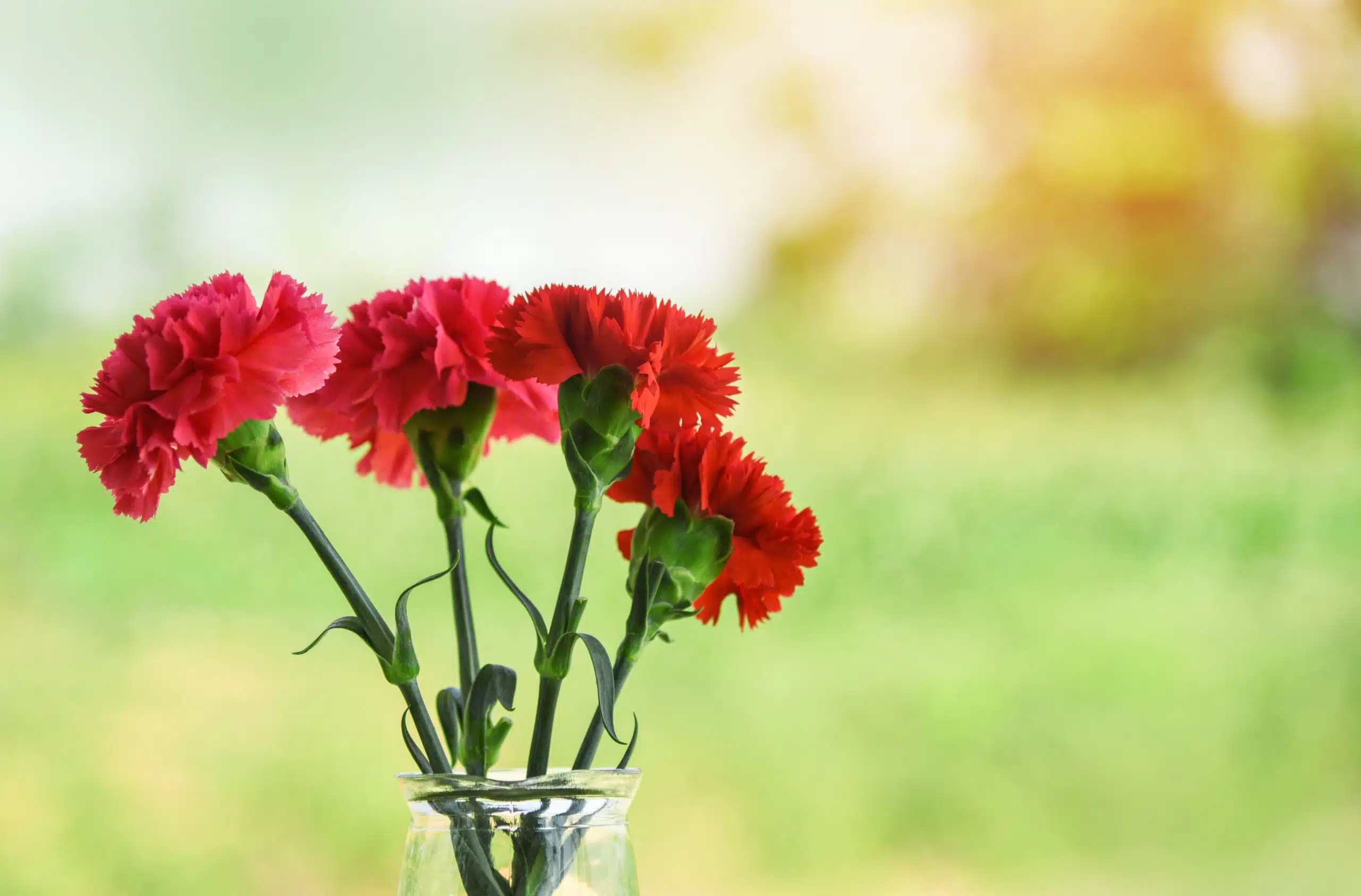
“Red Carnations” by Ella Wheeler Wilcox
One time in Arcadie’s fair bowers
There met a bright immortal band,
To choose their emblems from the flowers
That made an Eden of that land.
Sweet Constancy, with eyes of hope,
Strayed down the garden path alone
And gathered sprays of heliotrope,
To place in clusters at her zone.
True Friendship plucked the ivy green,
Forever fresh, forever fair.
Inconstancy with flippant mien
The fading primrose chose to wear.
One moment Love the rose paused by;
But Beauty picked it for her hair.
Love paced the garden with a sigh
He found no fitting emblem there.
Then suddenly he saw a flame,
A conflagration turned to bloom;
It even put the rose to shame,
Both in its beauty and perfume.
He watched it, and it did not fade;
He plucked it, and it brighter grew.
In cold or heat, all undismayed,
It kept its fragrance and its hue.
“Here deathless love and passion sleep,”
He cried, “embodied in this flower.
This is the emblem I will keep.”
Love wore carnations from that hour.
“Transplanted” by Emily Dickinson
As if some little Arctic flower,
Upon the polar hem,
Went wandering down the latitudes,
Until it puzzled came
To continents of summer,
To firmaments of sun,
To strange, bright crowds of flowers,
And birds of foreign tongue!
I say, as if this little flower
To Eden wandered in —
What then? Why, nothing, only,
Your inference therefrom!
“‘Tis Spring, My Love, ‘Tis Spring” by John Clare
’Tis Spring, my love, ’tis Spring,
And the birds begin to sing:
If ’t was Winter, left alone with you,
Your bonny form and face,
Would make a Summer place,
And be the finest flower that ever grew.
Tis Spring, my love, ’tis Spring,
And the hazel catkins hing,
While the snowdrop has its little blebs of dew;
But that’s not so white within
As your bosom’s hidden skin—
That sweetest of all flowers that ever grew.
The sun arose from bed,
All strewn with roses red,
But the brightest and the loveliest crimson place
Is not so fresh and fair,
Or so sweet beyond compare,
As thy blushing, ever smiling, happy face.
I love Spring’s early flowers,
And their bloom in its first hours,
But they never half so bright or lovely seem
As the blithe and happy grace
Of my darling’s blushing face,
And the happiness of loves young dream.
Short Poems About Flowers
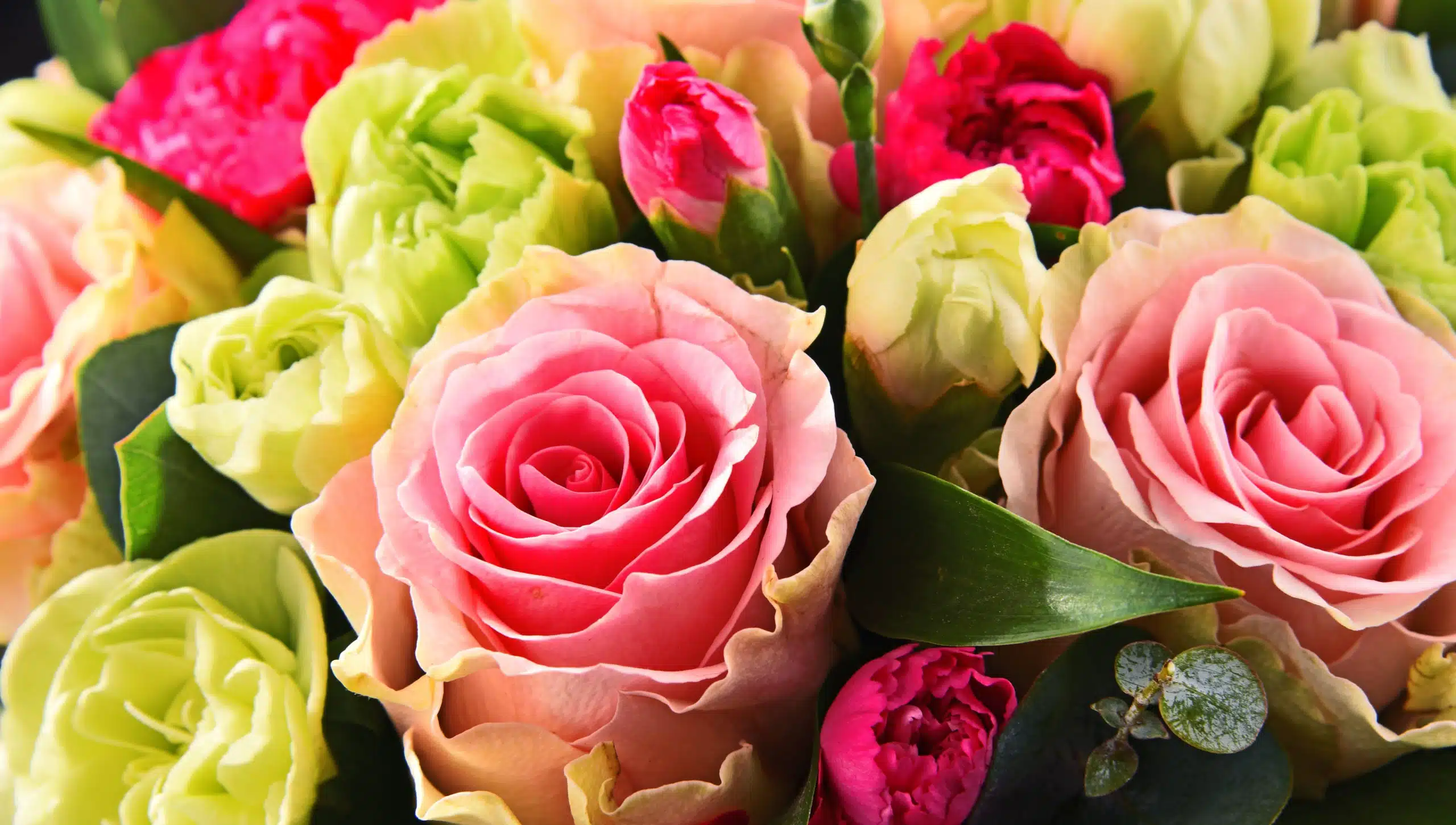
“The Dandelion” by Vachel Lindsay
O dandelion, rich and haughty,
King of village flowers!
Each day is coronation time,
You have no humble hours.
I like to see you bring a troop
To beat the blue-grass spears,
To scorn the lawn-mower that would be
Like fate’s triumphant shears.
Your yellow heads are cut away,
It seems your reign is o’er.
By noon you raise a sea of stars
More golden than before.
“The White Rose” by John Boyle O’Reilly
The red rose whispers of passion,
And the white rose breathes of love;
O, the red rose is a falcon,
And the white rose is a dove.
But I send you a cream-white rosebud
With a flush on its petal tips;
For the love that is purest and sweetest
Has a kiss of desire on the lips.
“Golden Glories” by Christina Rossetti
The buttercup is like a golden cup,
The marigold is like a golden frill,
The daisy with a golden eye looks up,
And golden spreads the flag beside the rill,
And gay and golden nods the daffodil,
The gorsey common swells a golden sea,
The cowslip hangs a head of golden tips,
And golden drips the honey which the bee
Sucks from sweet hearts of flowers and stores and sips.
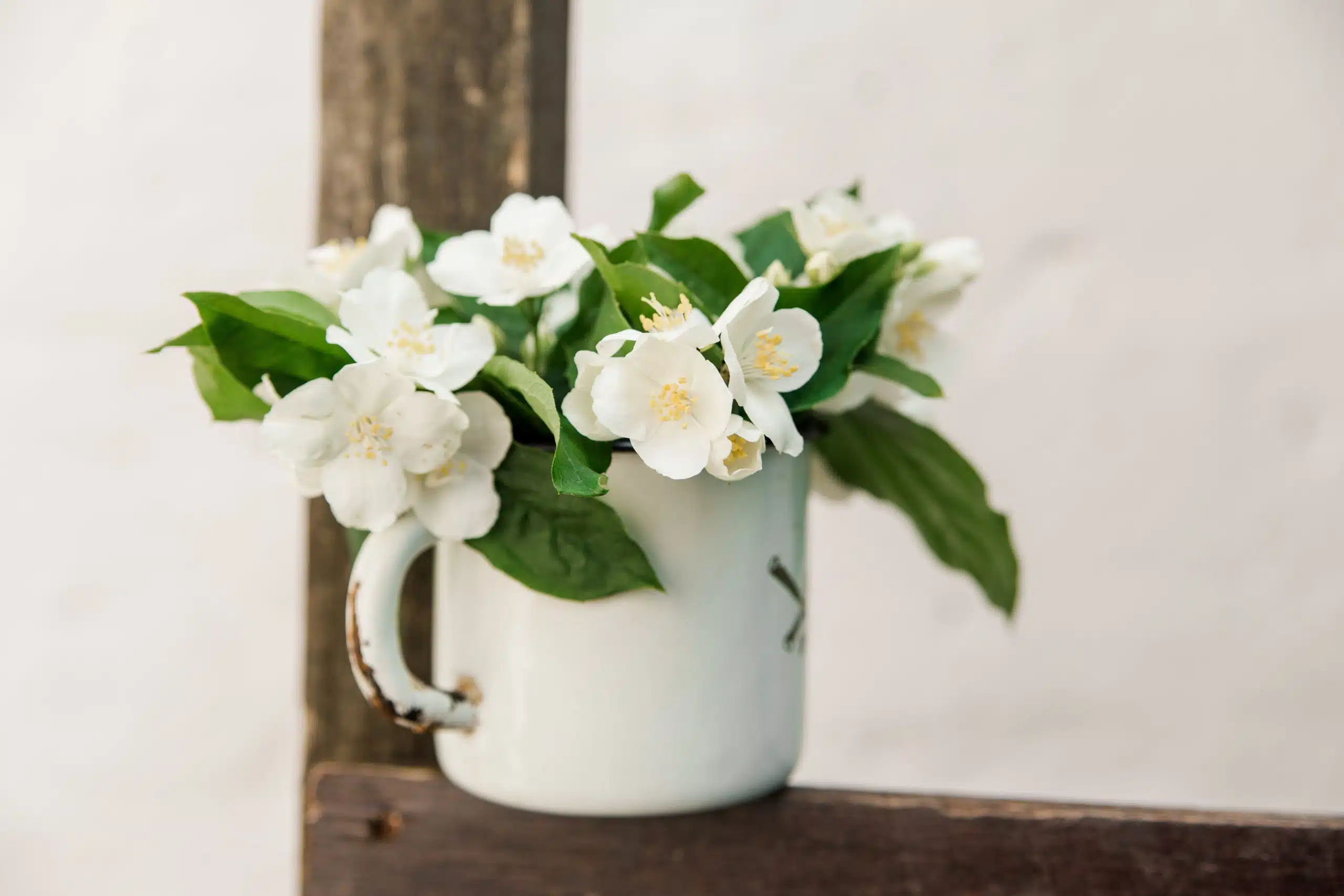
“A White Blossom” by D.H. Lawrence
A tiny moon as white and small as a single jasmine flower
Leans all alone above my window, on night’s wintry bower,
Liquid as lime-tree blossom, soft as brilliant water or rain
She shines, the one white love of my youth, which all sin cannot stain.
“The Lily” by William Blake
The modest Rose puts forth a thorn,
The humble sheep a threat’ning horn:
While the Lily white shall in love delight,
Nor a thorn nor a threat stain her beauty bright.
“The Stricken Flower” by Sappho (John Myers O’Hara, Translator)
Think not to ever look as once of yore,
Atthis, upon my love; for thou no more
Wilt find intact upon its stem the flower
Thy guile left slain and bleeding in that hour.
So ruthless shepherds crush beneath their feet
The hill flower blooming in the summer heat;
The hyacinth whose purple heart is found
Left bruised and dead, to darken on the ground.
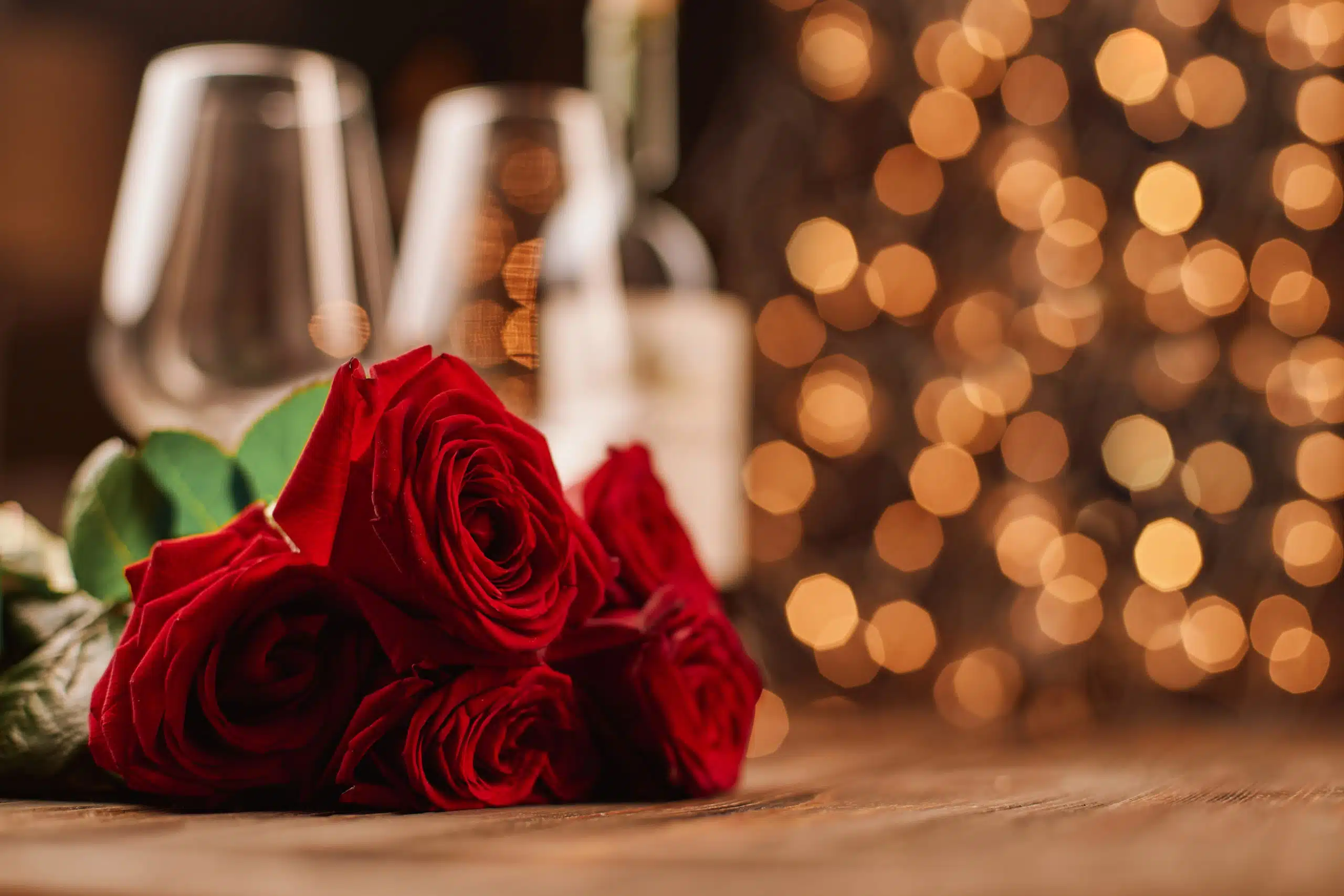
“See How the Roses Burn!” by Hafez
See how the roses burn!
Bring wine to quench the fire!
Alas! the flames come up with us,—
We perish with desire.
“Ts’ai Chi’h” by Ezra Pound
The petals fall in the fountain,
the orange coloured rose-leaves,
Their ochre clings to the stone.
“A Cloud of Flowers!” by Matsuo Basho
A cloud of flowers!
Is the bell Uyeno
Or Asakusa?
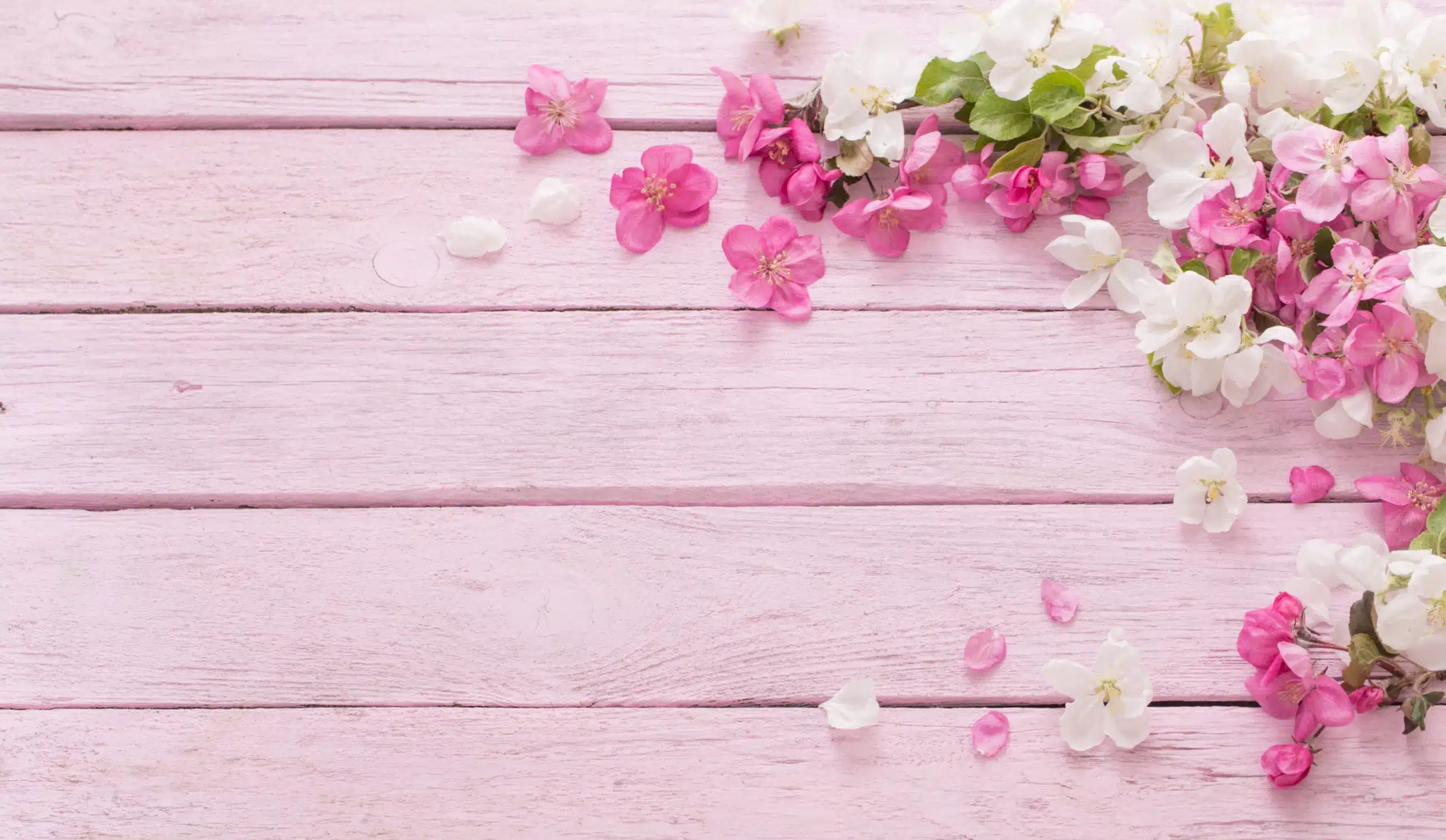
“Thaw” by Lola Ridge
Blow through me wind
As you blow through apple blossoms…
Scatter me in shining petals over the passers-by…
Joyously I reunite… sway and gather to myself…
Sedately I walk by the dancing feet of children—
Not knowing I too dance over the cobbled spring.
O, but they laugh back at me,
(Eyes like daisies smiling wide open),
And we both look askance at the snowed-in people
Thinking me one of them.
“Serepta Mason” by Edgar Lee Masters
My life’s blossom might have bloomed on all sides
Save for a bitter wind which stunted my petals
On the side of me which you in the village could see.
From the dust I lift a voice of protest:
My flowering side you never saw!
Ye living ones, ye are fools indeed
Who do not know the ways of the wind
And the unseen forces
That govern the processes of life.
“For Daughters of Magdalen” by Countee Cullen
Ours is the ancient story:
Delicate flowers of sin,
Lilies, arrayed in glory,
That would not toil nor spin.
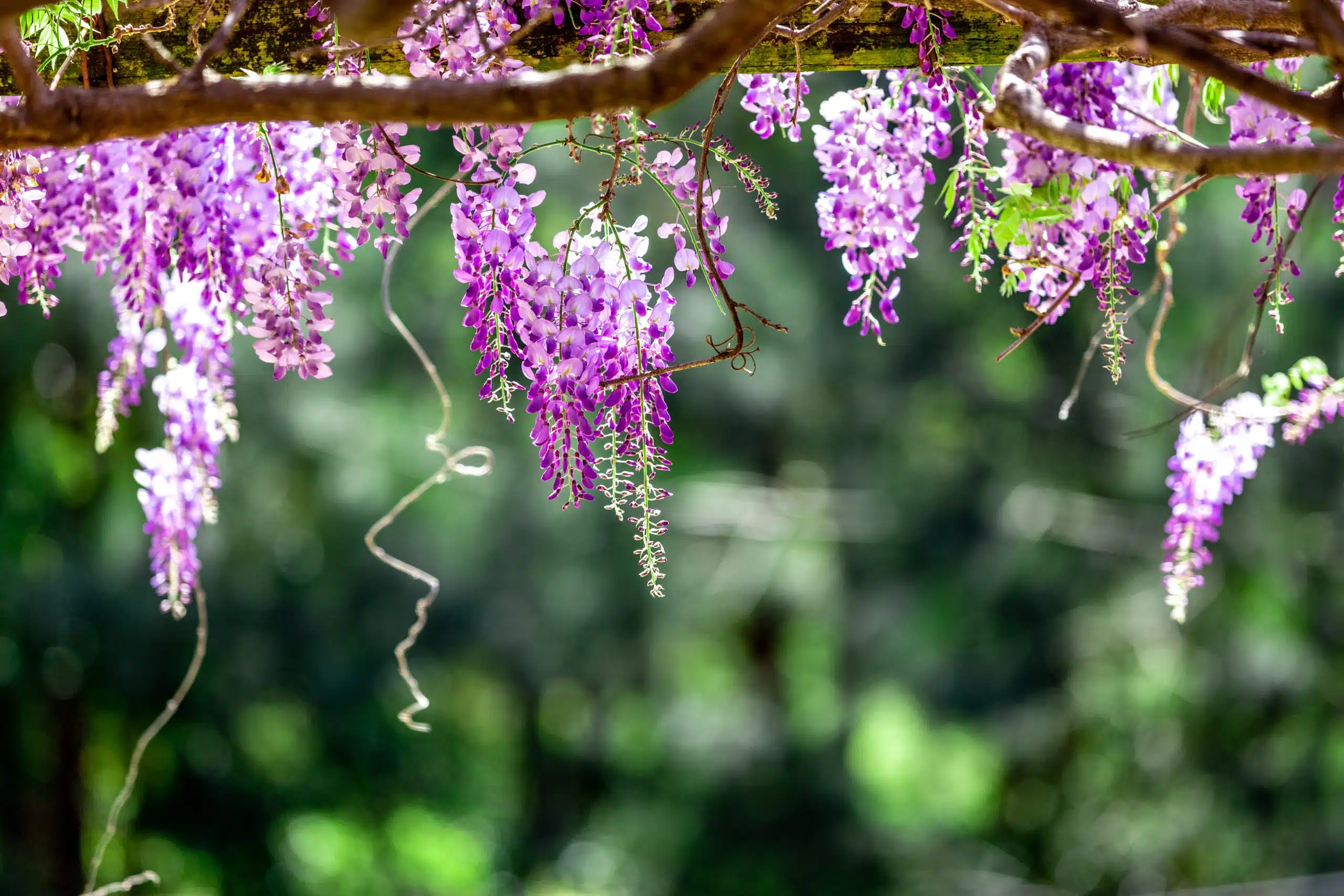
“I Come Weary” by Matsuo Basho
I come weary,
In search of an inn—
Ah! These wisteria flowers!
“Dawn” by Adam Lindsay Gordon
On skies still and starlit
White lustres take hold,
And grey flushes scarlet,
And red flashes gold.
And sun-glories cover
The rose shed above her,
Like lover and lover
They flame and unfold.
“Gnomics IV” by Sappho (John Myers O’Hara, Translator)
Beauty of youth is but the flower
Of spring, whose pleasure lasts an hour;
While worth that knows no mortal doom
Is like the amaranthine bloom.
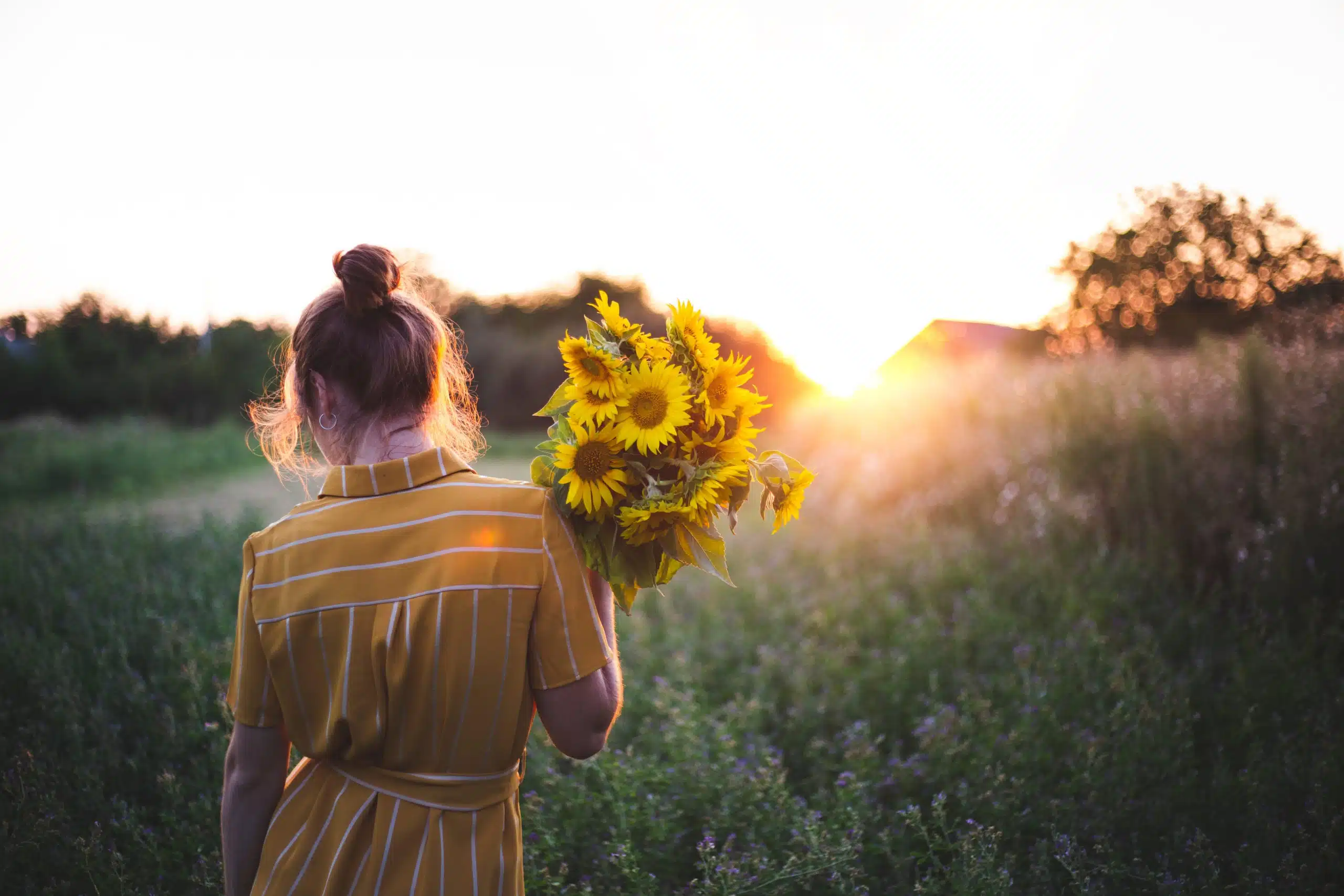
“Sun Flowers” by Hilda Conkling
Sun-flowers, stop growing!
If you touch the sky where those clouds are passing
Like tufts of dandelion gone to seed,
The sky will put you out!
You know it is blue like the sea . . .
Maybe it is wet, too!
Your gold faces will be gone forever
If you brush against that blue
Ever so softly!
“Matins” by Henry van Dyke
Flowers rejoice when night is done,
Lift their heads to greet the sun;
Sweetest looks and odours raise,
In a silent hymn of praise.
So my heart would turn away
From the darkness to the day;
Lying open in God’s sight
Like a flower in the light.
“The Snow-Blossoms” by Clark Ashton Smith
But yestereve the winter trees
Reared leafless, blackly bare,
Their twigs and branches poignant-marked
Upon the sunset-flare.
White-petaled, opens now the dawn,
And in its pallid glow,
Revealed, each leaf-lorn, barren tree
Stands white with flowers of snow.
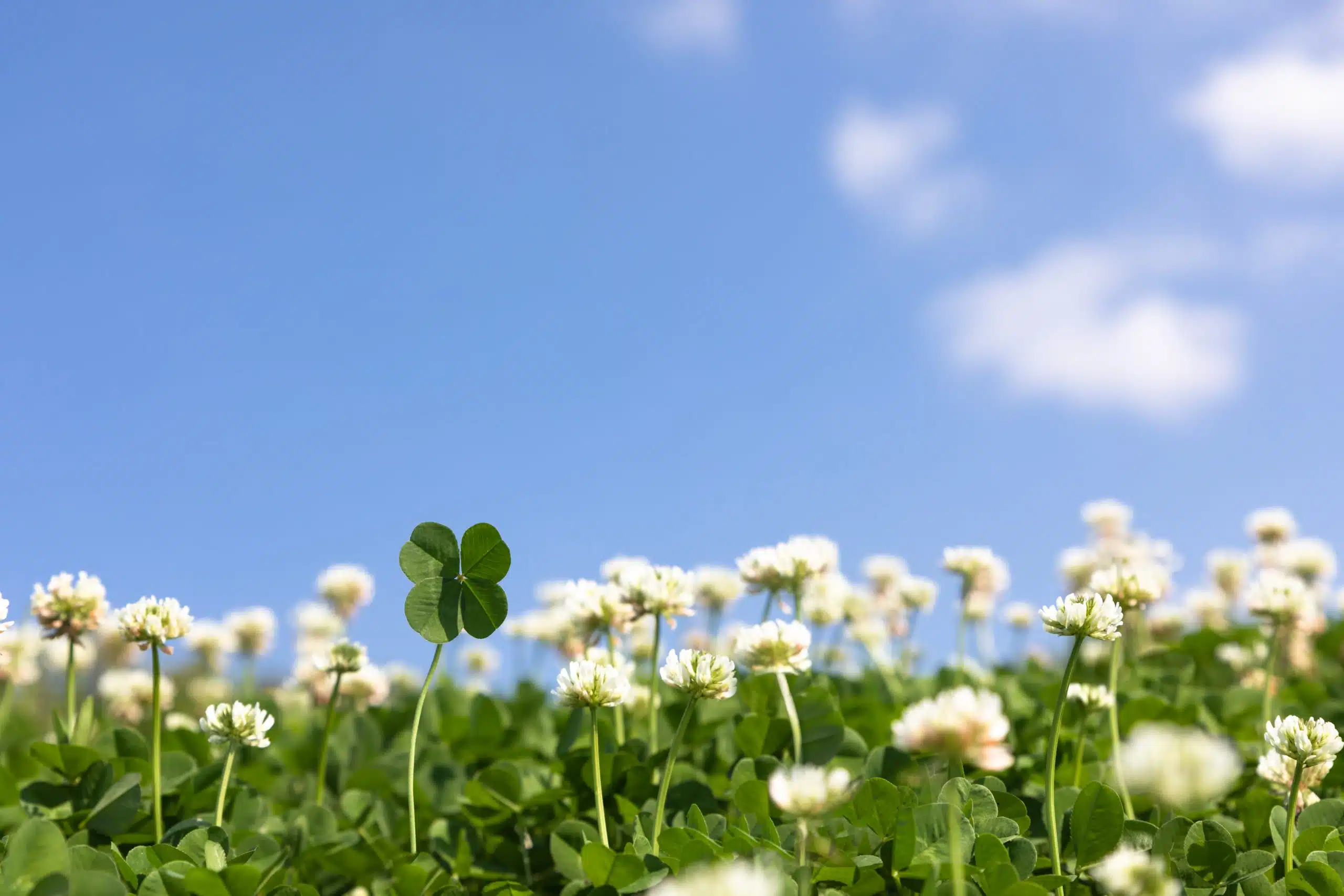
“Perhaps You’d Like to Buy a Flower?” by Emily Dickinson
Perhaps you’d like to buy a flower?
But I could never sell.
If you would like to borrow
Until the daffodil
Unties her yellow bonnet
Beneath the village door,
Until the bees, from clover rows
Their hock and sherry draw,
Why, I will lend until just then,
But not an hour more!
“Rose-Petal” by Hilda Conkling
Petal with rosy cheeks,
Petal with thoughts of your own,
Petal of my crimson-white flower out of June,
Little petal of my heart!
“Fairy Lanterns” by Clark Ashton Smith
‘Tis said these blossom-lanterns light
The elves upon their midnight way;
That fairy toil and elfin play
Receive their beams of magic white.
I marvel not if it be true;
I know this flower has lighted me
Nearer to Beauty’s mystery,
And past the veils of secrets new.
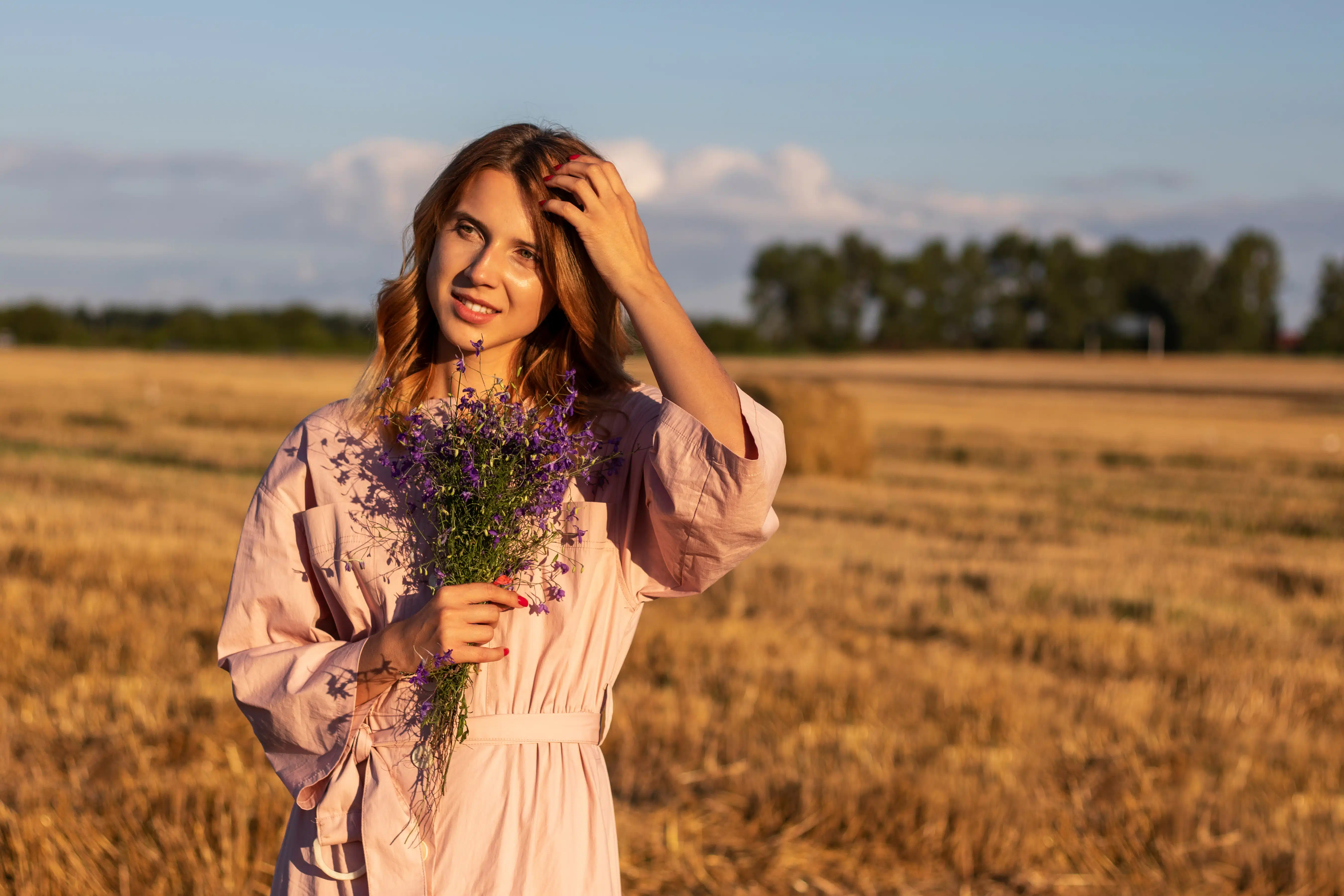
“The Hours of Afternoon III” by Émile Verhaeren (F. S. Flint, Translator)
If other flowers adorn the house and the splendour of the countryside, the pure ponds shine still in the grass with the great eyes of water of their mobile face.
Who can say from what far-off and unknown distances so many new birds have come with sun on their wings?
In the garden, April has given way to July, and the blue tints to the great carnation tints; space is warm and the wind frail; a thousand insects glisten joyously in the air; and summer passes in her robe of diamonds and sparks.
Poems on Flowers
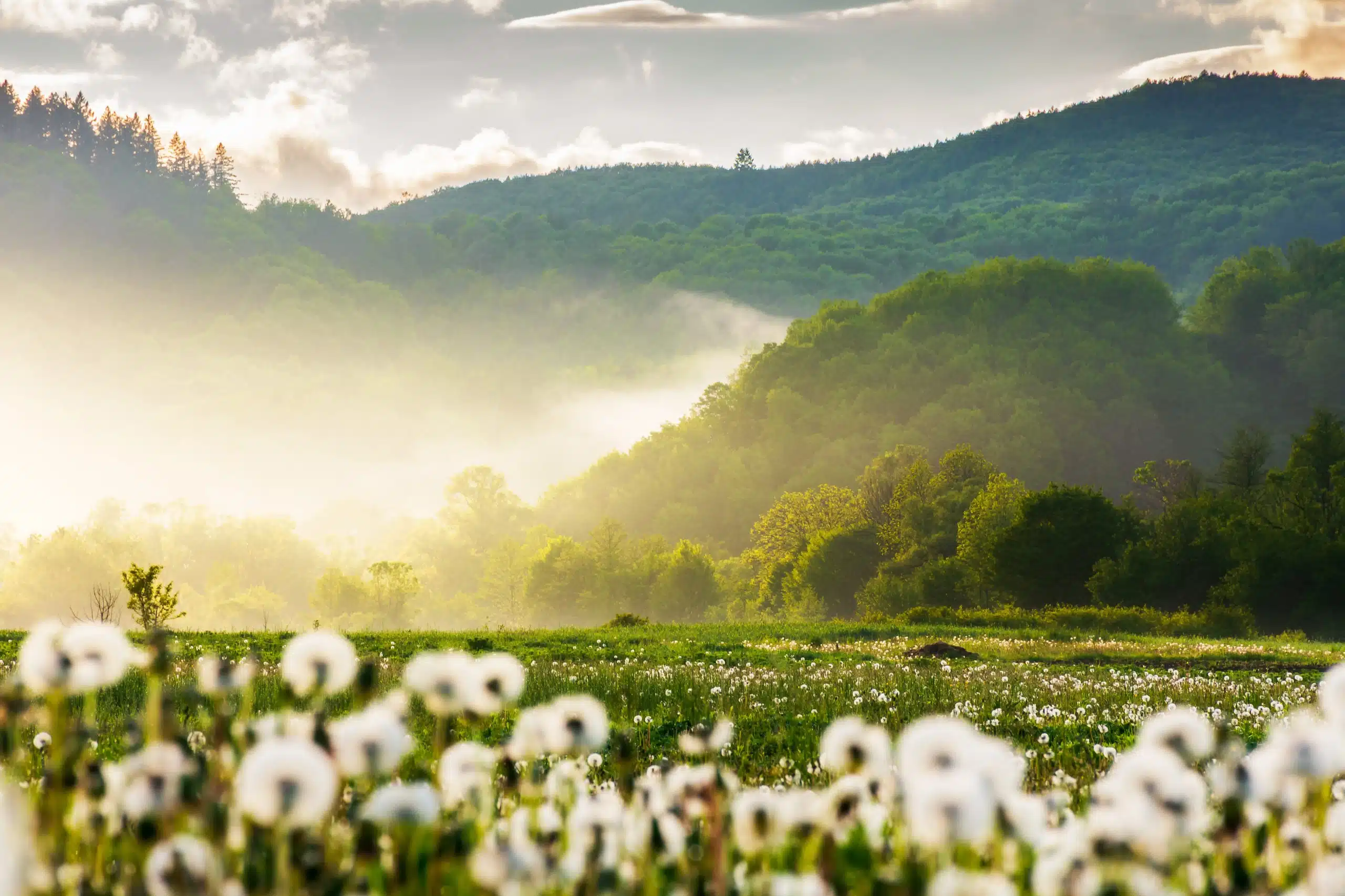
“Dandelions” by Frances Ellen Watkins Harper
Welcome children of the Spring,
In your garbs of green and gold,
Lifting up your sun-crowned heads
On the verdant plain and wold.
As a bright and joyous troop
From the breast of earth ye came
Fair and lovely are your cheeks,
With sun-kisses all aflame.
In the dusty streets and lanes,
Where the lowly children play,
There as gentle friends ye smile,
Making brighter life’s highway
Dewdrops and the morning sun,
Weave your garments fair and bright,
And we welcome you to-day
As the children of the light.
Children of the earth and sun.
We are slow to understand
All the richness of the gifts
Flowing from our Father’s hand.
“Sea Rose” by H. D.
Rose, harsh rose,
marred and with stint of petals,
meagre flower, thin,
sparse of leaf,
more precious
than a wet rose
single on a stem—
you are caught in the drift.
Stunted, with small leaf,
you are flung on the sand,
you are lifted
in the crisp sand
that drives in the wind.
Can the spice-rose
drip such acrid fragrance
hardened in a leaf?
“Follies” by Carl Sandburg
Shaken,
The blossoms of lilac,
And shattered,
The atoms of purple.
Green dip the leaves,
Darker the bark,
Longer the shadows.
Sheer lines of poplar
Shimmer with masses of silver
And down in a garden old with years
And broken walls of ruin and story,
Roses rise with red rain-memories.
May!
In the open world
The sun comes and finds your face,
Remembering all.
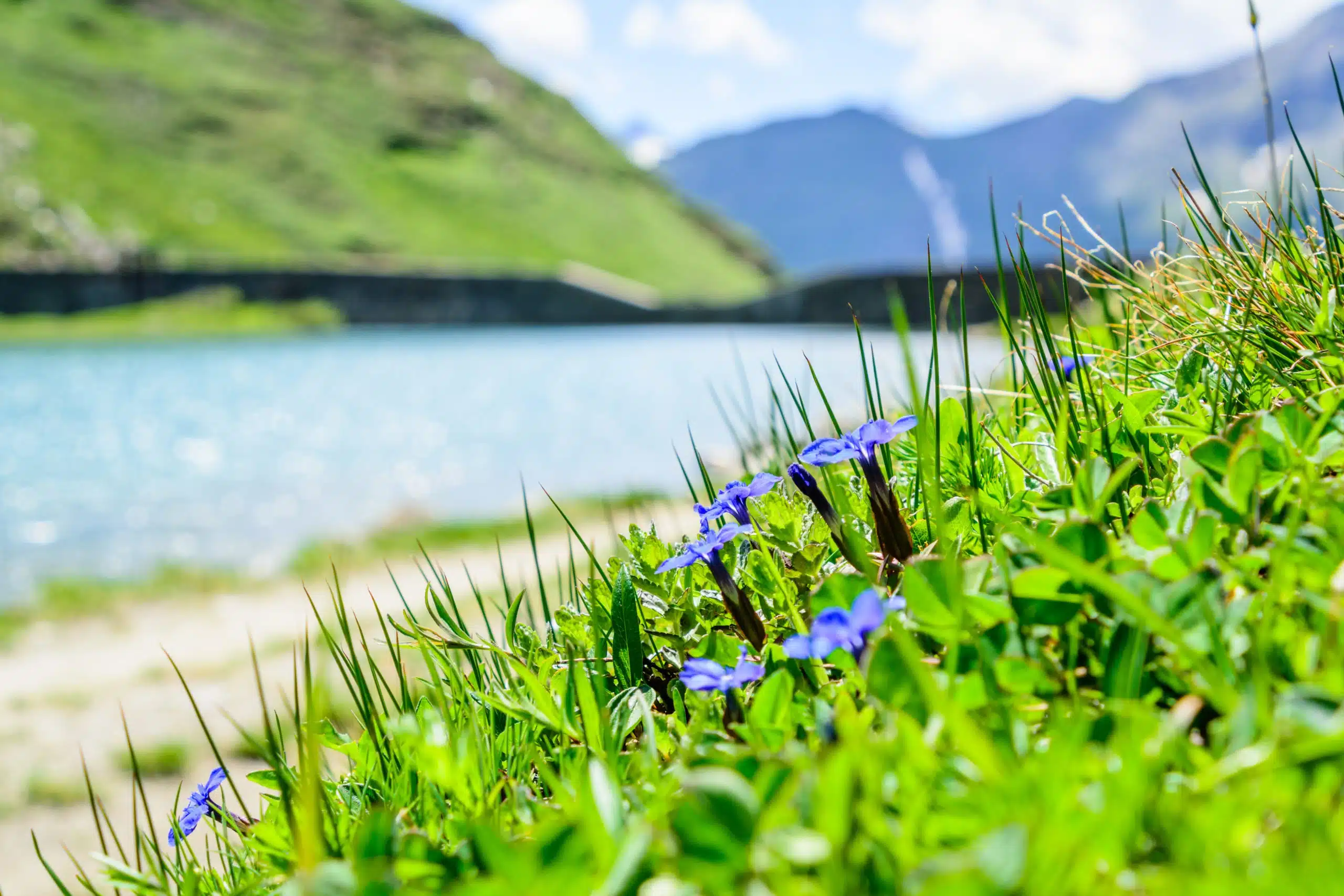
“Fringed Gentians” by Amy Lowell
Near where I live there is a lake
As blue as blue can be, winds make
It dance as they go blowing by.
I think it curtseys to the sky.
It’s just a lake of lovely flowers
And my Mamma says they are ours;
But they are not like those we grow
To be our very own, you know.
We have a splendid garden, there
Are lots of flowers everywhere;
Roses, and pinks, and four o’clocks
And hollyhocks, and evening stocks.
Mamma lets us pick them, but never
Must we pick any gentians — ever!
For if we carried them away
They’d die of homesickness that day.
“Before Quiet” by Hazel Hall
I will think of water-lilies
Growing in a darkened pool,
And my breath shall move like water,
And my hands be limp and cool.
It shall be as though I waited
In a wooden place alone;
I will learn the peace of lilies
And will take it for my own.
If a twinge of thought, if yearning
Come like wind into this place,
I will bear it like the shadow
Of a leaf across my face.
“Fides, Spes” by Willa Cather
Joy is come to the little
Everywhere;
Pink to the peach and pink to the apple,
White to the pear.
Stars are come to the dogwood,
Astral, pale;
Mists are pink on the red-bud,
Veil after veil.
Flutes for the feathery locusts,
Soft as spray;
Tongues of the lovers for chestnuts, poplars,
Babbling May.
Yellow plumes for the willows’
Wind-blown hair;
Oak trees and sycamores only
Comfortless bare.
Sore from steel and the watching,
Somber and old,—
Wooing robes for the beeches, larches,
Splashed with gold;
Breath o’ love to the lilac,
Warm with noon.—
Great hearts cold when the little
Beat mad so soon.
What is their faith to bear it
Till it come,
Waiting with rain-cloud and swallow,
Frozen, dumb?
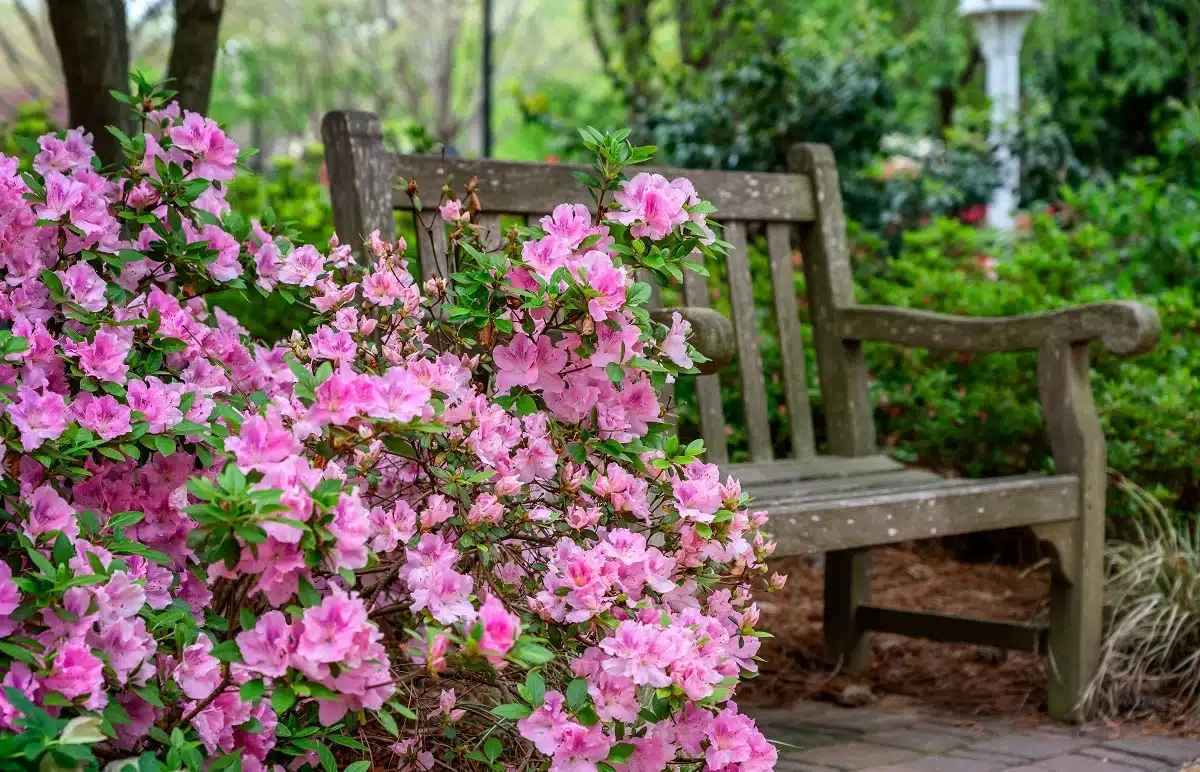
“Sonnet 2” by Gwendolyn Bennett
Some things are very dear to me—
Such things as flowers bathed by rain
Or patterns traced upon the sea
Or crocuses where snow has lain …
the iridescence of a gem,
The moon’s cool opalescent light,
Azaleas and the scent of them,
And honeysuckles in the night.
And many sounds are also dear—
Like winds that sing among the trees
Or crickets calling from the weir
Or Negroes humming melodies.
But dearer far than all surmise
Are sudden tear-drops in your eyes.
“Spring in Tulwa Thlocco” by Alexander Posey
Thro’ the vine-embowered portal blows
The fragrant breath of summer-time;
Far, the river, brightly winding, goes
With murmurs falling into rhyme.
It is spring in Tulwa Thlocco now;
The fresher hue of grass and tree
All but hides upon the mountain’s brow
The green haunts of the chickadee.
There are drifts of plum blooms, snowy white,
Along the lane and greening hedge;
And the dogwood blossoms cast a light
Upon the forest’s dusky edge.
Crocus, earliest flower of the year,
Hangs out its starry petals where
The spring beauties in their hiding peer,
And the red-buds crimson all the air.
“Pieria’s Rose” by Sappho (John Myers O’Hara, Translator)
Pale death shall come, and thou and thine shall be,
Then and thereafter, to all memory
Forgotten as the wind that yesterday
Blew the last lingering apple buds away;
For thou hadst never that undying rose
To grace the brow and shed immortal glows;
Pieria’s fadeless flower that few may claim
To wreathe and save thy unremembered name.
Ay! even on the fields of Dis unknown,
Obscure among the shadows and alone,
Thy flitting shade shall pass uncomforted
Of any heed from all the flitting dead.
But no one maid, I think, beneath the skies,
At any time shall live and be as wise,
In sooth, as I am; for the Muses Nine
Have made me honored and their gifts are mine;
And men, I think, will never quite forget
My songs or me; so long as stars shall set
Or sun shall rise, or hearts feel love’s desire,
My voice shall cross their dreams, a sigh of fire.
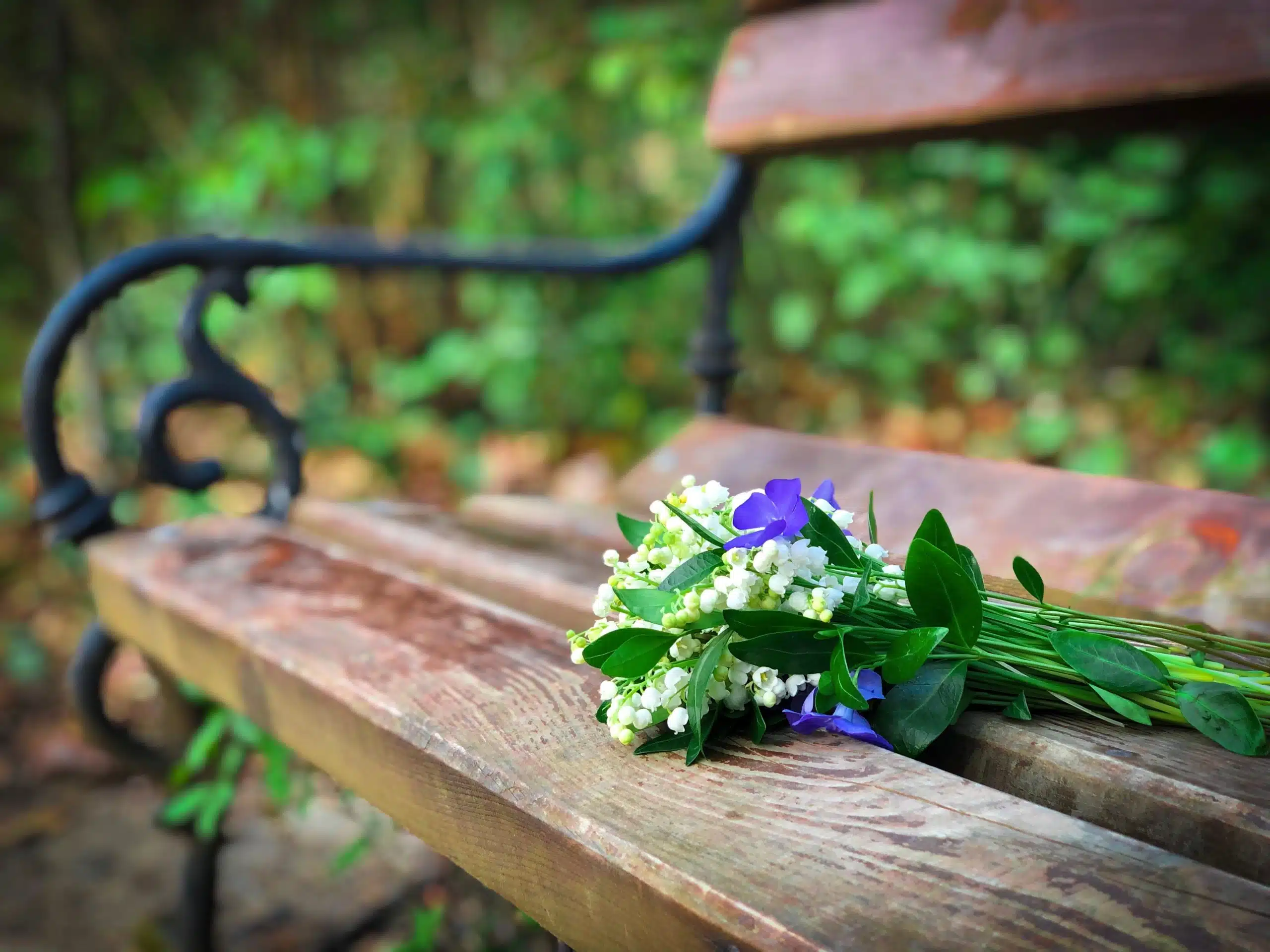
“May-Flower” by Emily Dickinson
Pink, small, and punctual,
Aromatic, low,
Covert in April,
Candid in May,
Dear to the moss,
Known by the knoll,
Next to the robin
In every human soul.
Bold little beauty,
Bedecked with thee,
Nature forswears
Antiquity.
“Every Rose Hath Its Thorn” by James McIntyre
There was a maiden all forlorn,
She loved a youth, his name was Thorn,
But he was shy for to disclose
How he loved dear the sweet May Rose.
Lustre sweet it would give to Thorn,
If this fair flower would it adorn,
Said he all other names above
Your charming name alone I love.
Said she of beauty ’tis soon shorn,
Unless that it is joined to Thorn,
It very soon doth droop and die,
And she heaved a gentle sigh.
Said he we’ll wed to-morrow morn,
No more from me you shall be torn,
For you will banish all my woes,
And near my heart I’ll wear the rose.
Now little rose buds they are born,
All clinging to the parent Thorn,
In grace and beauty each one grows,
Full worthy of the sweet May Rose.
Some flowers they only shed their bloom
In the sweet month of leafy June,
But May doth bloom each month in year
A fragrant Rose forever dear.
“Flowers” by Felicia Hemans
Welcome, O pure and lovely forms! again
Unto the shadowy stillness of my room!
For not alone ye bring a joyous train
Of summer-thoughts attendant on your bloom—
Visions of freshness, of rich bowery gloom,
Of the low murmurs filling mossy dells,
Of stars that look down on your folded bells
Through dewy leaves, of many a wild perfume
Greeting the wanderer of the hill and grove
Like sudden music: more than this ye bring—
Far more; ye whisper of the all-fostering love
Which thus hath clothed you, and whose dove-like wing
Broods o’er the sufferer drawing fever’d breath,
Whether the couch be that of life or death.
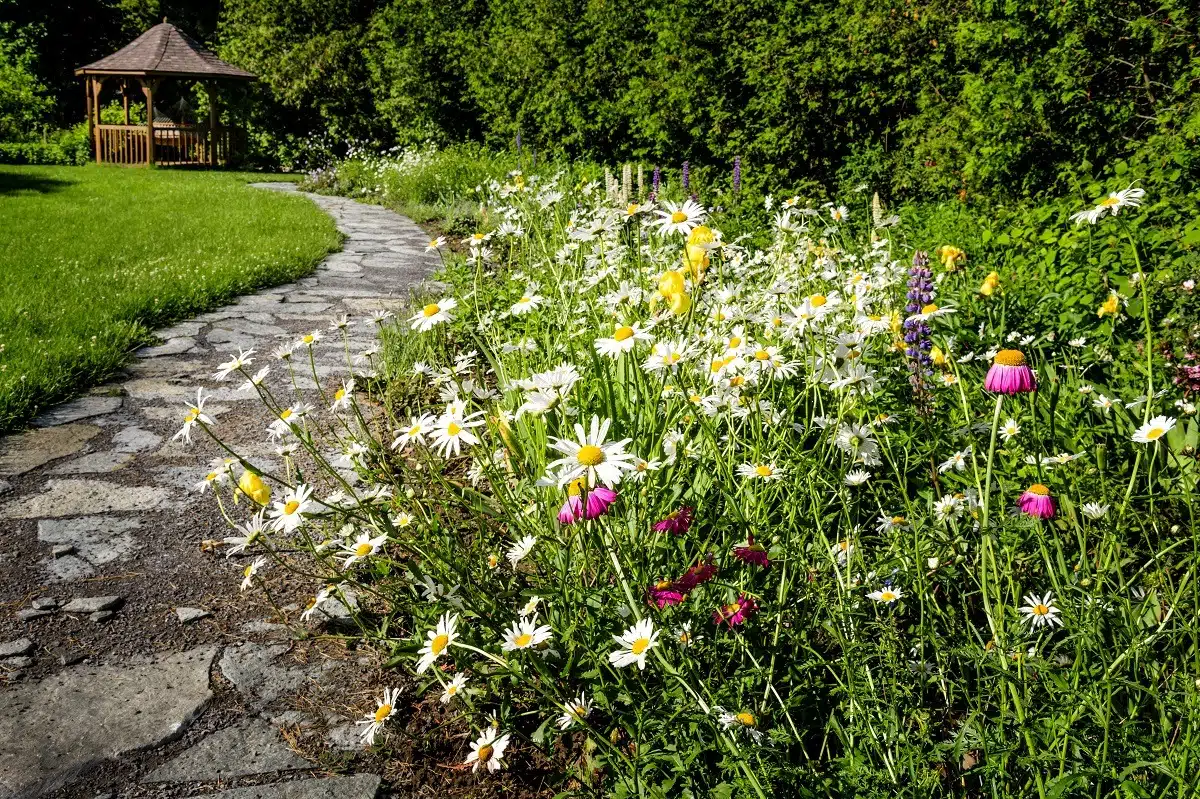
“The Daisy Follows Soft the Sun” by Emily Dickinson
The daisy follows soft the sun,
And when his golden walk is done,
Sits shyly at his feet.
He, waking, finds the flower near.
“Wherefore, marauder, art thou here?”
“Because, sir, love is sweet!”
We are the flower, Thou the sun!
Forgive us, if as days decline,
We nearer steal to Thee, —
Enamoured of the parting west,
The peace, the flight, the amethyst,
Night’s possibility!
“Golden Pulse” by Sappho (John Myers O’Hara, Translator)
Golden pulse grew on the shore,
Ferns along the hill,
And the red cliff roses bore
Bees to drink their fill;
Bees that from the meadows bring
Wine of melilot,
Honey-sups on golden wing
To the garden grot.
But to me, neglected flower,
Phaon will not see,
Passion brings no crowning hour,
Honey nor the bee.
“Only Morning-Glory that Flowered” by Hilda Conkling
Under the vine I saw one morning-glory
A tight unfolding bud
Half out.
He looked hard down into my lettuce-bed.
He was thinking hard.
He said I want a friend!
I was standing there:
I said, Well, I am here! Don’t you see me?
But he thought and thought.
The next day I found him happy,
Quite out,
Looking about the world.
The wind blew sweet airs,
Carried away his perfume in the sun;
And near by swung a new flower
Uncurling its hands . . .
He was not thoughtful
Any more!
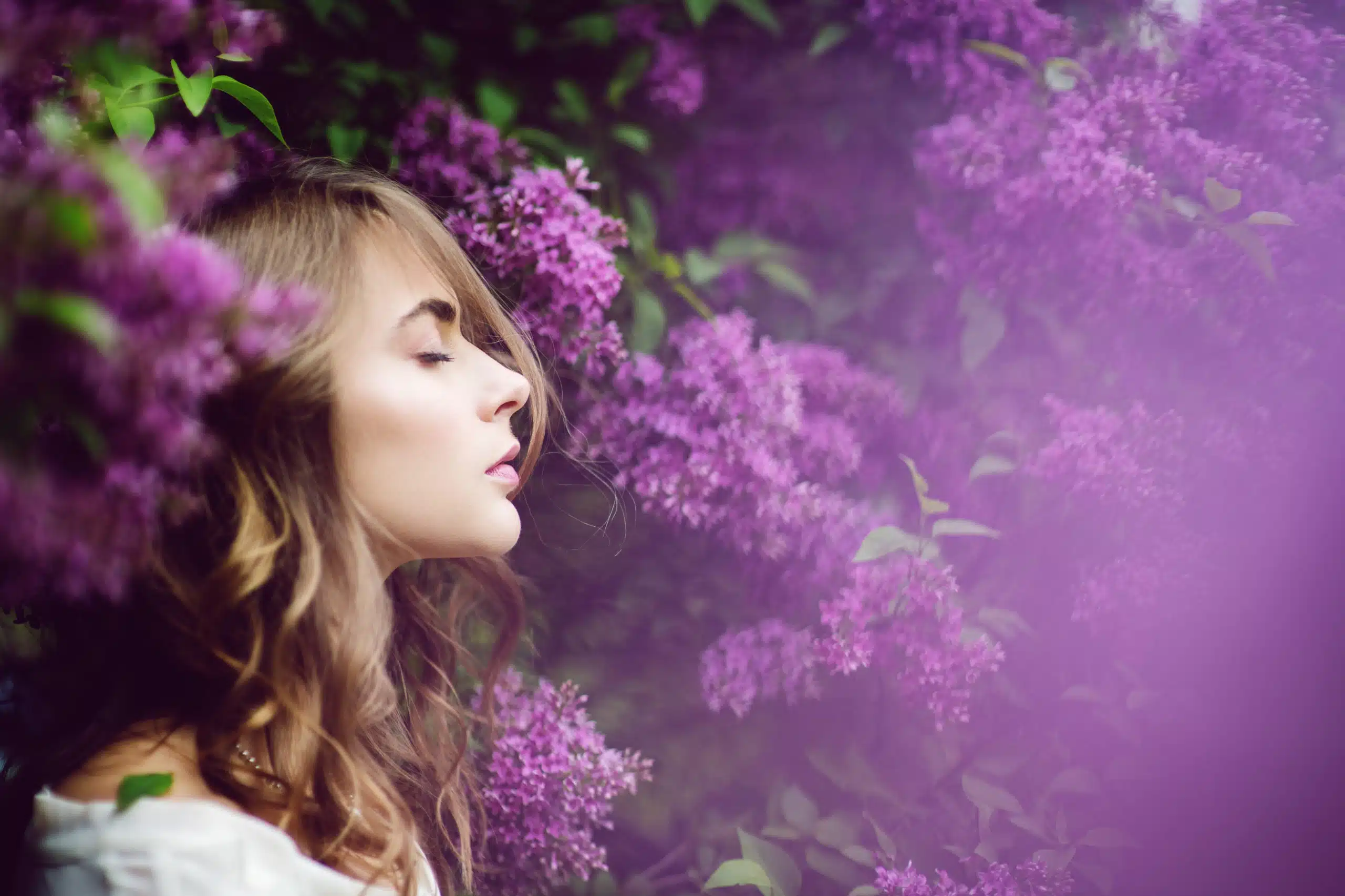
From “Poems” by Iris Tree
Moonlit lilacs under the window,
And the pale smell of their falling blossoms,
And the white floating beams like luminous moths
Fluttering from bloom to bloom.
Sprays of lilac flowers
Frothing at the green verge of midnight waves,
Frozen to motionless icicles.
Moonlight flows over me,
Spreads her bright watery hair over my face,
Full of illicit, marvellous perfumes
Wreathed with syringa and plaited with hyacinths;
Hair of the moonlight falling about me,
Straight and cool as the drooping tresses of rain.
“Le Jardin” by Oscar Wilde
The lily’s withered chalice falls
Around its rod of dusty gold,
And from the beech-trees on the wold
The last wood-pigeon coos and calls.
The gaudy leonine sunflower
Hangs black and barren on its stalk,
And down the windy garden walk
The dead leaves scatter,—hour by hour.
Pale privet-petals white as milk
Are blown into a snowy mass:
The roses lie upon the grass
Like little shreds of crimson silk.
Inspirational Poems About Flowers
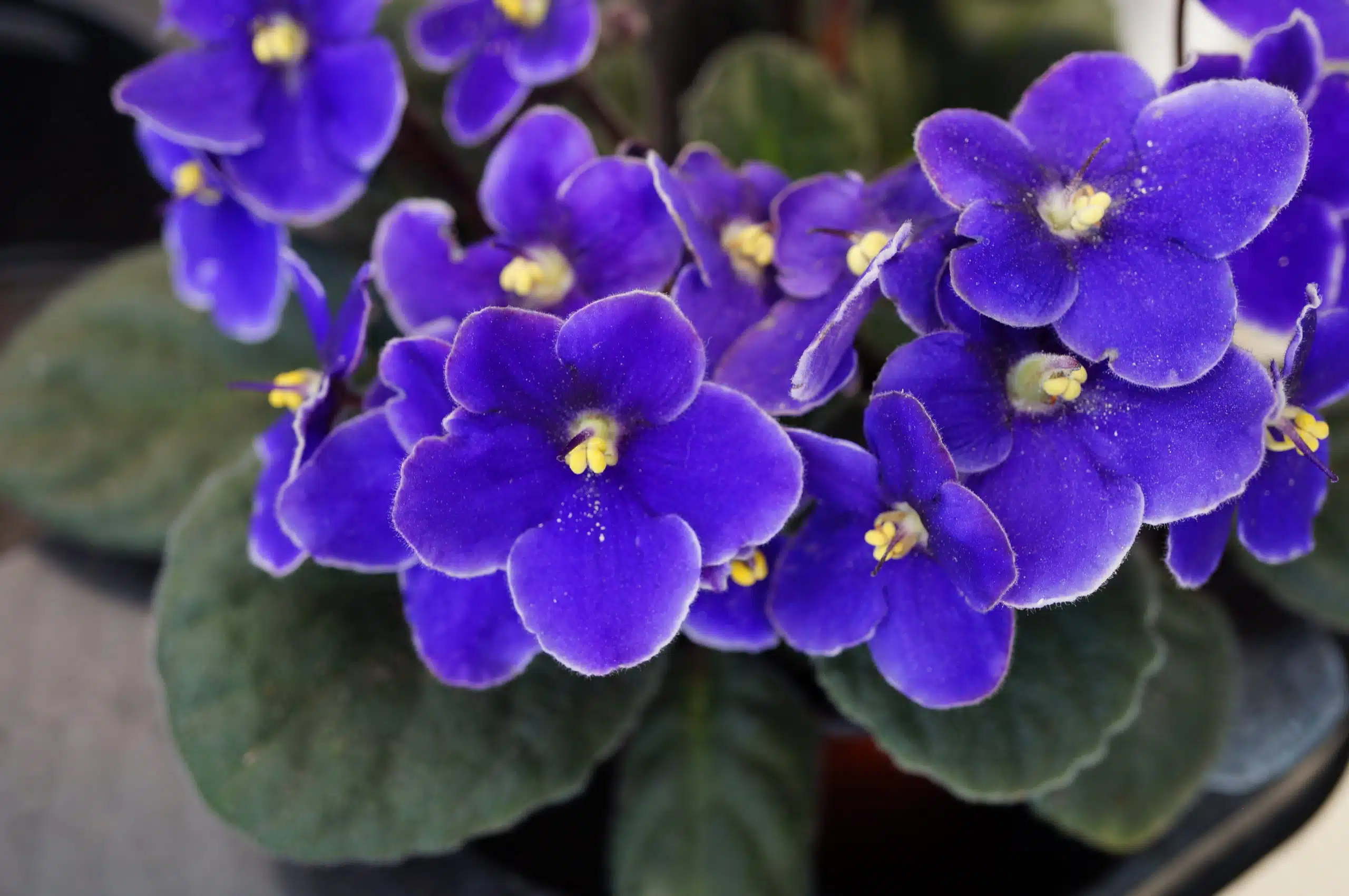
“The Violet” by Jane Taylor
Down in a green and shady bed
A modest violet grew;
Its stalk was bent, it hung its head,
As if to hide from view.
And yet it was a lovely flower,
Its colors bright and fair;
It might have graced a rosy bower,
Instead of hiding there.
Yet there it was content to bloom,
In modest tints arrayed;
And there diffused a sweet perfume,
Within the silent shade.
Then let me to the valley go,
This pretty flower to see;
That I may also learn to grow
In sweet humility.
“Buttercups and Daisies” by Mary Howitt
Buttercups and daisies,
Oh, the pretty flowers,
Coming ere the spring time,
To tell of sunny hours.
While the tree are leafless,
While the fields are bare,
Buttercups and daisies
Spring up here and there.
Ere the snowdrop peepeth,
Ere the crocus bold,
Ere the early primrose
Opes its paly gold,
Somewhere on the sunny bank
Buttercups are bright;
Somewhere ‘mong the frozen grass
Peeps the daisy white.
Little hardy flowers,
Like to children poor,
Playing in their sturdy health
By their mother’s door,
Purple with the north wind,
Yet alert and bold;
Fearing not, and caring not,
Though they be a-cold!
What to them is winter!
What are stormy showers!
Buttercups and daisies
Are these human flowers!
He who gave them hardships
And a life of care,
Gave them likewise hardy strength
And patient hearts to bear.
“A Spring Morning” by John Clare
The Spring comes in with all her hues and smells,
In freshness breathing over hills and dells;
O’er woods where May her gorgeous drapery flings,
And meads washed fragrant by their laughing springs.
Fresh are new opened flowers, untouched and free
From the bold rifling of the amorous bee.
The happy time of singing birds is come,
And Love’s lone pilgrimage now finds a home;
Among the mossy oaks now coos the dove,
And the hoarse crow finds softer notes for love.
The foxes play around their dens, and bark
In joy’s excess, ’mid woodland shadows dark.
The flowers join lips below; the leaves above;
And every sound that meets the ear is Love.
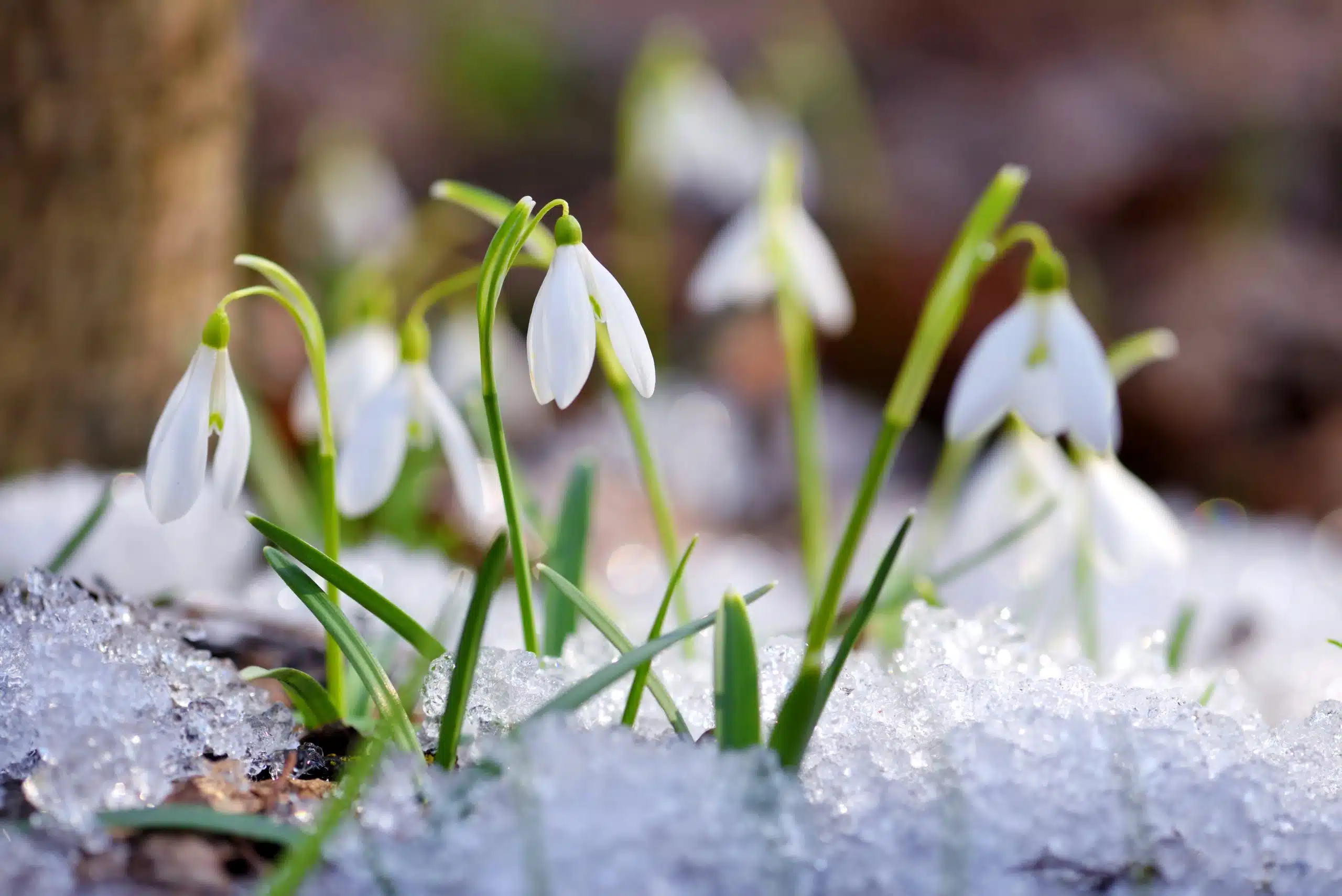
“Waiting to Grow” by Frank French
Little white snowdrop just waking up,
Violet, daisy, and sweet buttercup,
Think of the flowers that are under the snow,
Waiting to grow!
And think what a number of queer little seeds,
Of flowers and mosses, of ferns and of weeds,
Are under the leaves and under the snow,
Waiting to grow!
Think of the roots getting ready to sprout,
Reaching their slender brown fingers about,
Under the ice and the leaves and the snow,
Waiting to grow!
No seed is so small, or hidden so well,
That God cannot find it; and soon he will tell
His sun where to shine, and His rain where to go,
Making it grow!
“The Shining Hours II” by Émile Verhaeren (F. S. Flint, Translator)
Although we saw this bright garden, wherein we pass silently, flower before our eyes, it is rather in us that grows the pleasantest and fairest garden in the world.
For we live all the flowers, all the plants and all the grasses in our laughter and our tears of pure and calm happiness.
For we live all the transparencies of the blue pond that reflects the rich growths of the golden roses and the great vermilion lilies, sun-lips and mouths.
For we live all joy, thrown out in the cries of festival and spring of our avowals, wherein heartfelt and uplifting words sing side by side.
Oh! is it not indeed in us that grows the pleasantest and the gladdest garden in the world?
From “Flowers” by James Russell Lowell
A poem every flower is,
And every leaf a line,
And with delicious memories
They fill this heart of mine:
No living blossoms are so clear
As these dead relics treasured here;
One tells of Love, of friendship one,
Love’s quiet after-sunset time,
When the all-dazzling light is gone,
And, with the soul’s low vesper-chime,
O’er half its heaven doth out-flow
A holy calm and steady glow.
Some are gay feast-songs, some are dirges,
In some a joy with sorrow merges;
One sings the shadowed woods, and one the roar
Of ocean’s everlasting surges,
Tumbling upon the beach’s hard-beat floor,
Or sliding backward from the shore
To meet the landward waves and slowly plunge once more.
O flowers of grace, I bless ye all
By the dear faces ye recall!
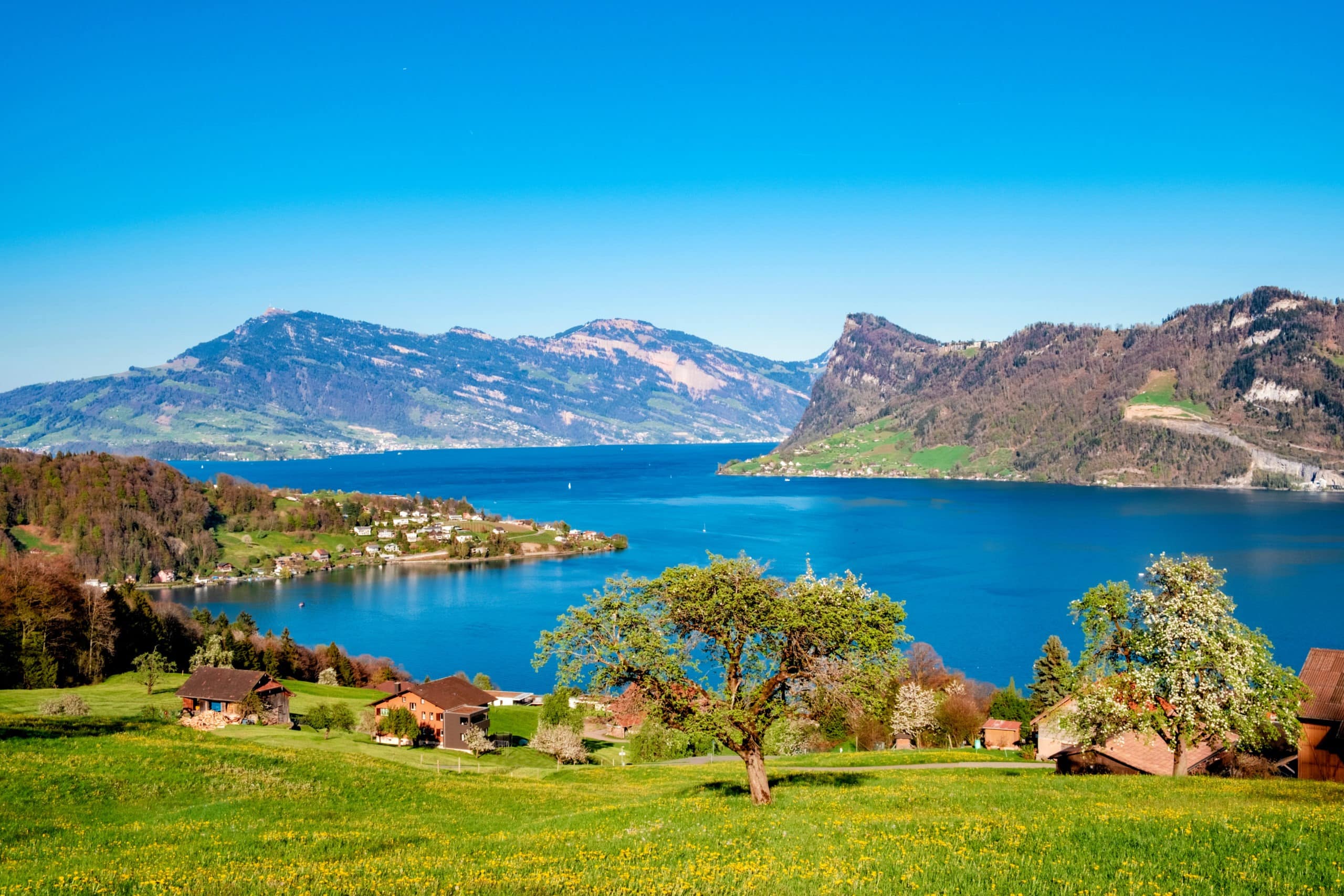
“On a Flower From the Field of Grütli” by Felicia Hemans
Whence art thou, flower? From holy ground,
Where freedom’s foot hath been!
Yet bugle-blast or trumpet-sound
Ne’er shook that solemn scene.
Flower of a noble field! thy birth
Was not where spears have cross’d,
And shiver’d helms have strewn the earth,
Midst banners won and lost.
But where the sunny hues and showers
Unto thy cup were given,
There met high hearts at midnight hours,
Pure hands were raised to heaven;
And vows were pledged that man should roam
Through every Alpine dell
Free as the wind, the torrent’s foam,
The shaft of William Tell.
And prayer, the full deep flow of prayer,
Hallow’d the pastoral sod;
And souls grew strong for battle there,
Nerved with the peace of God.
Before the Alps and stars they knelt,
That calm devoted band,
And rose, and made their spirits felt
Through all the mountain-land.
Then welcome, Grütli’s free-born flower!
Even in thy pale decay
There dwells a breath, a tone, a power,
Which all high thoughts obey.
“A Lowly Flower” by Bay Sie T’iao (Charles Budd, Translator)
A flowering grass I rise
From the side of a far-spread lake,
Whose waters lave and fertilize,
And all my thirsty tissues slake.
The dews of Spring with gentle power
Evolve my glossy emerald leaves;
The colours of my fragrant flower
The rime of early Autumn weaves.
And yet in trembling fear I grow,
Lest root and stem should be uptorn
By sudden storm or rushing flow,
And leave me helpless and forlorn.
So here contented will I lie,
Although a plant of humble birth;
Nor try to soar to realms on high
Above the confines of the earth.
For never yet has living soul
By strength or wisdom changed his fate;
All things are under heaven’s control,
Who allocates to each his state.
“The Wanderer and the Night Flowers” by Felicia Hemans
“Call back your odours, lovely flowers!
From the night-winds call them back;
And fold your leaves till the laughing hours
Come forth in the sunbeam’s track!
“The lark lies couch’d in her grassy nest,
And the honey-bee is gone,
And all bright things are away to rest—
Why watch ye here alone?
“Is not your world a mournful one,
When your sisters close their eyes,
And your soft breath meets not a lingering tone
Of song in the starry skies?
“Take ye no joy in the dayspring’s birth
When it kindles the sparks of dew?
And the thousand strains of the forest’s mirth,
Shall they gladden all but you?
“Shut your sweet bells till the fawn comes out
On the sunny turf to play,
And the woodland child with a fairy shout
Goes dancing on its way!”
“Nay! let our shadowy beauty bloom
When the stars give quiet light,
And let us offer our faint perfume
On the silent shrine of night.
“Call it not wasted, the scent we lend
To the breeze, when no step is nigh:
Oh, thus for ever the earth should send
Her grateful breath on high!
“And love us as emblems, night’s dewy flowers,
Of hopes unto sorrow given,
That spring through the gloom of the darkest hours
Looking alone to heaven!”
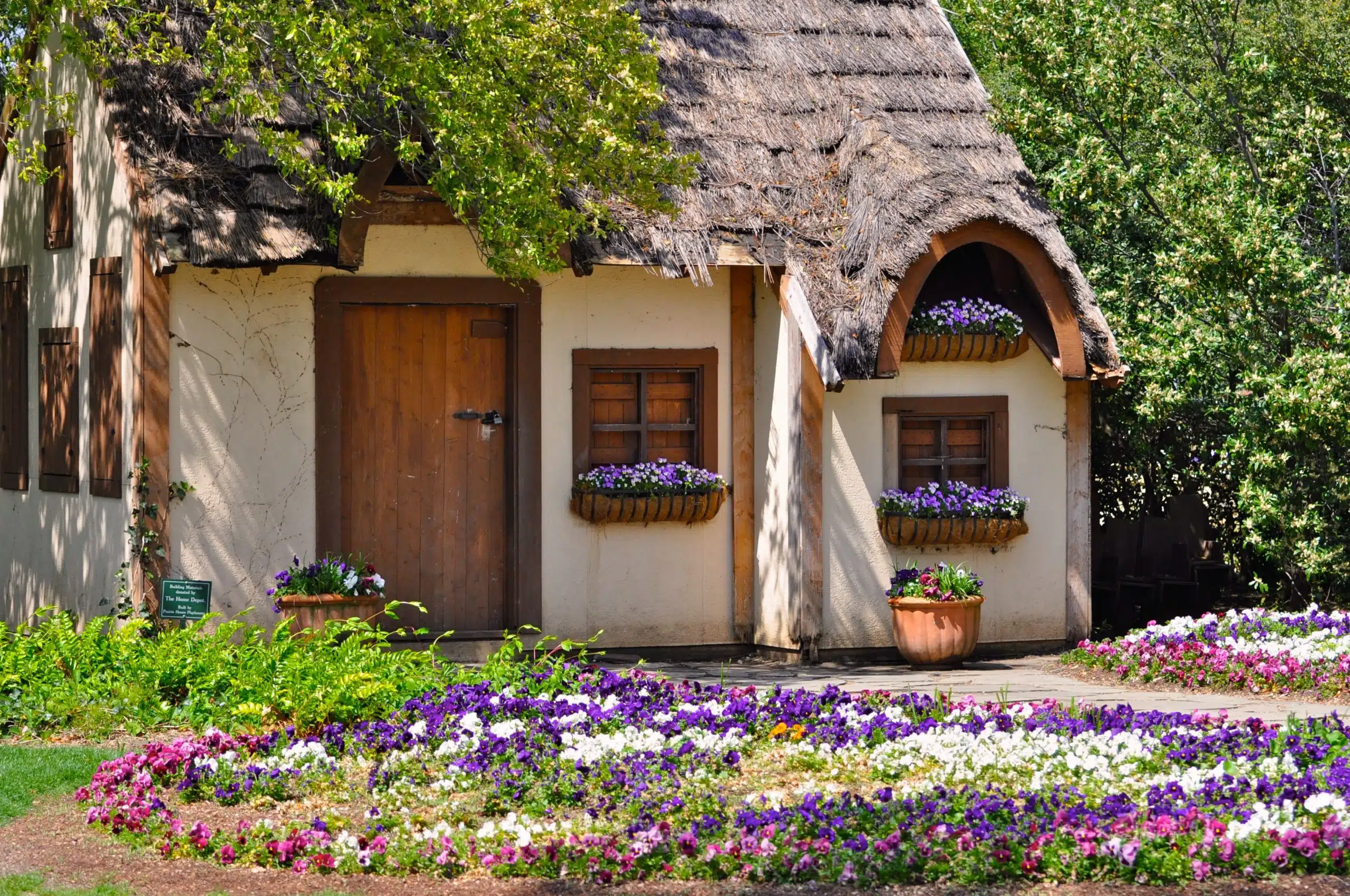
“The Seeds of Love” by Mrs. Fleetwood Habergham
I sowed the seeds of love, it was all in the spring,
In April, May, and June, likewise, when small birds they do sing;
My garden’s well planted with flowers everywhere,
Yet I had not the liberty to choose for myself the flower that I loved so dear.
My gardener he stood by, I asked him to choose for me,
He chose me the violet, the lily and pink, but those I refused all three;
The violet I forsook, because it fades so soon,
The lily and the pink I did o’erlook, and I vowed I’d stay till June.
In June there’s a red rose-bud, and that’s the flower for me!
But often have I plucked at the red rose-bud till I gained the willow-tree;
The willow-tree will twist, and the willow-tree will twice,—
O! I wish I was in the dear youth’s arms that once had the heart of mine.
My gardener he stood by, he told me to take great care,
For in the middle of a red rose-bud there grows a sharp thorn there;
I told him I’d take no care till I did feel the smart,
And often I plucked at the red rose-bud till I pierced it to the heart.
I’ll make me a posy of hyssop,—no other I can touch,—
That all the world may plainly see I love one flower too much;
My garden is run wild! where shall I plant anew—
For my bed, that once was covered with thyme, is all overrun with rue?
“To an April Daisy” by John Clare
Welcome, old Comrade! peeping once again;
Our meeting ’minds me of a pleasant hour:
Spring’s pencil pinks thee in that blushy stain,
And Summer glistens in thy tinty flower.
Hail, Beauty’s Gem! disdaining time nor place;
Carelessly creeping on the dunghill’s side;
Demeanour’s softness in thy crimpled face
Decks thee in beauties unattain’d by pride.
Hail, ’Venturer! once again that fearless here
Encampeth on the hoar hill’s sunny side;
Spring’s early messenger! thou’rt doubly dear;
And winter’s frost by thee is well supplied.
Now winter’s frowns shall cease their pelting rage,
But winter’s woes I need not tell to thee;
Far better luck thy visits well presage,
And be it thine and mine that luck to see.
Ah, may thy smiles confirm the hopes they tell
To see thee frost-bit I’d be griev’d at heart;
I meet thee happy, and I wish thee well,
Till ripening summer summons us to part.
Then like old mates, or two who’ve neighbours been,
We’ll part, in hopes to meet another year;
And o’er thy exit from this changing scene
We’ll mix our wishes in a tokening tear.
“To an Early Daffodil” by Amy Lowell
Thou yellow trumpeter of laggard Spring!
Thou herald of rich Summer’s myriad flowers!
The climbing sun with new recovered powers
Does warm thee into being, through the ring
Of rich, brown earth he woos thee, makes thee fling
Thy green shoots up, inheriting the dowers
Of bending sky and sudden, sweeping showers,
Till ripe and blossoming thou art a thing
To make all nature glad, thou art so gay;
To fill the lonely with a joy untold;
Nodding at every gust of wind to-day,
To-morrow jewelled with raindrops. Always bold
To stand erect, full in the dazzling play
Of April’s sun, for thou hast caught his gold.
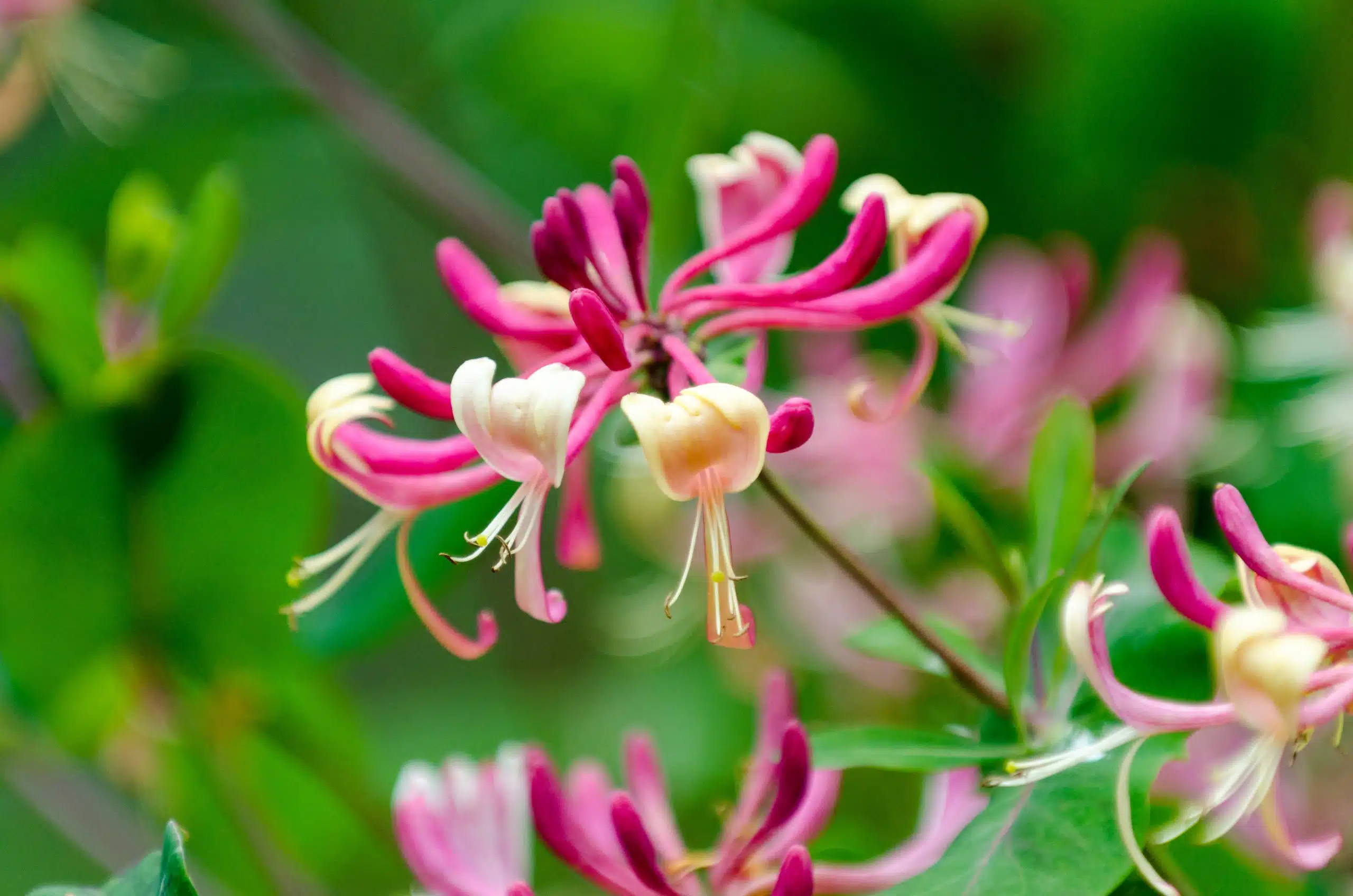
“The Wild Honeysuckle” by Philip Freneau
Fair flower, that dost so comely grow,
Hid in this silent, dull retreat,
Untouch’d thy honey’d blossoms blow,
Unseen thy little branches greet:
No roving foot shall crush thee here,
No busy hand provoke a tear.
By Nature’s self in white array’d,
She bade thee shun the vulgar eye,
And planted here the guardian shade,
And sent soft waters murmuring by;
Thus quietly thy summer goes,
Thy days declining to repose.
Smit with those charms, that must decay,
I grieve to see thy future doom;
They died—nor were those flowers more gay,
(The flowers that did in Eden bloom)
Unpitying frosts and Autumn’s power
Shall leave no vestige of this flower.
From morning suns and evening dews
At first thy little being came:
If nothing once, you nothing lose,
For when you die you are the same;
The space between is but an hour,
The mere idea of a flower.
“The Beauty of Snow” by Pao-Chao (Charles Budd, Translator)
A thousand miles across the Dragon Mountains
The North Wind blows the whirling flakes of snow,
Until they gather on my terraced garden,
And drift before the gate in furrowed row.
Unlike the coloured plum and fragrant peach trees,
Whose buds stretch forth to greet the warm Spring days,
At dawn the snow lies in unsullied whiteness,
But flees to shelter from the sun’s bright rays.
The peach flower and the plum flower have a beauty,
Which flourish in the warmth of sun and shower;
The snow’s brief charm is purity and brightness,
It does not claim the sun tints of the flower.
“A Psyche of Spring” by George Marion McClellan
Thou gaily painted butterfly, exquisite thing,
A child of light and blending rainbow hues,
In loveliness a Psyche of the Spring,
Companion for the rose and diamond dews;
‘Tis thine, in sportive joy, from hour to hour,
To ride the breeze from flower to flower.
But thou wast once a worm of hueless dye.
Now, seeing thee, gay thing, afloat in bliss,
I take new hope in thoughts of bye and bye,
When I, as thou, have shed my chrysalis.
I dream now of eternal springs of light
In which, as thou, I too may have my flight.
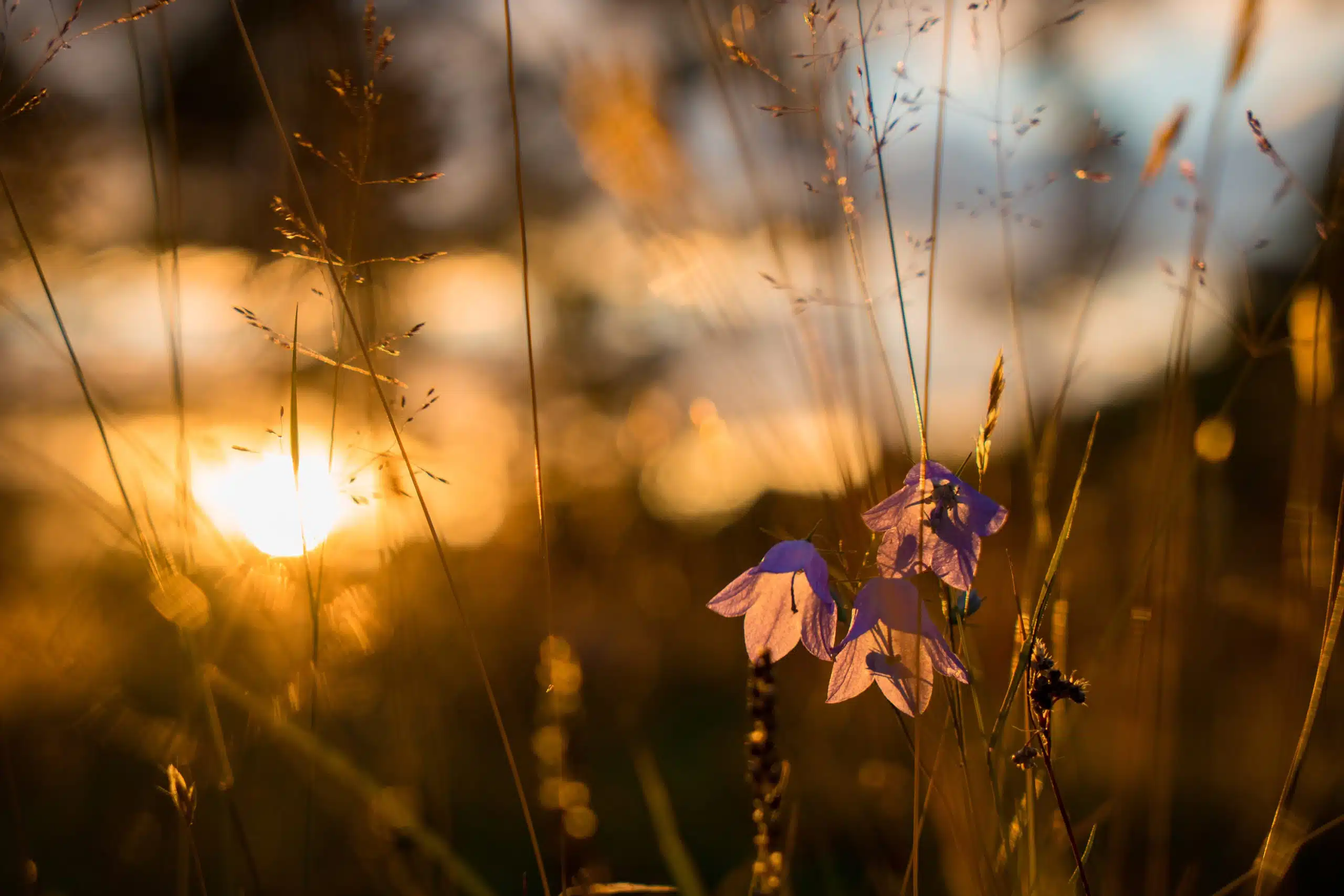
“Fire-Flowers” by Emily Pauline Johnson
And only where the forest fires have sped,
Scorching relentlessly the cool north lands,
A sweet wild flower lifts its purple head,
And, like some gentle spirit sorrow-fed,
It hides the scars with almost human hands.
And only to the heart that knows of grief,
Of desolating fire, of human pain,
There comes some purifying sweet belief,
Some fellow-feeling beautiful, if brief.
And life revives, and blossoms once again.
“Requiescat in Pace” by Libbie C. Baer
Cover with flowers the wound of the dart,
Fill it with flowers, the void in the heart;
Tenderest thoughts are unfolding to-day,
Sweet as the blossoms a-bloom in the May.
Think not of suffering, bloodshed and strife,
Think not of loss that hath come to thy life,
Think of the peace with suffering done,
Think of the glories their sacrifice won.
“The Flower at My Window” by Lucian B. Watkins
O! my heart now feels so cheerful as I go with footsteps light
In the daily toil of my dear home;
And I’ll tell to you the secret that now makes my life so bright—
There’s a flower at my window in full bloom.
It is radiant in the sunshine, and so cheerful after rain;
And it wafts upon the air its sweet perfume.
It is very, very lovely! May its beauties never wane—
This dear flower at my window in full bloom.
Nature has so clothed it in such glorious array,
And it does so cheer our home, and hearts illume;
Its dear mem’ry I will cherish though the flower fade away—
This dear flower at my window in full bloom.
Oft I gaze upon this flower with its blossoms pure and white.
And I think as I behold its gay costume,
While through life we all are passing may our lives be always bright
Like this flower at my window in full bloom.
Flower Poems About Life
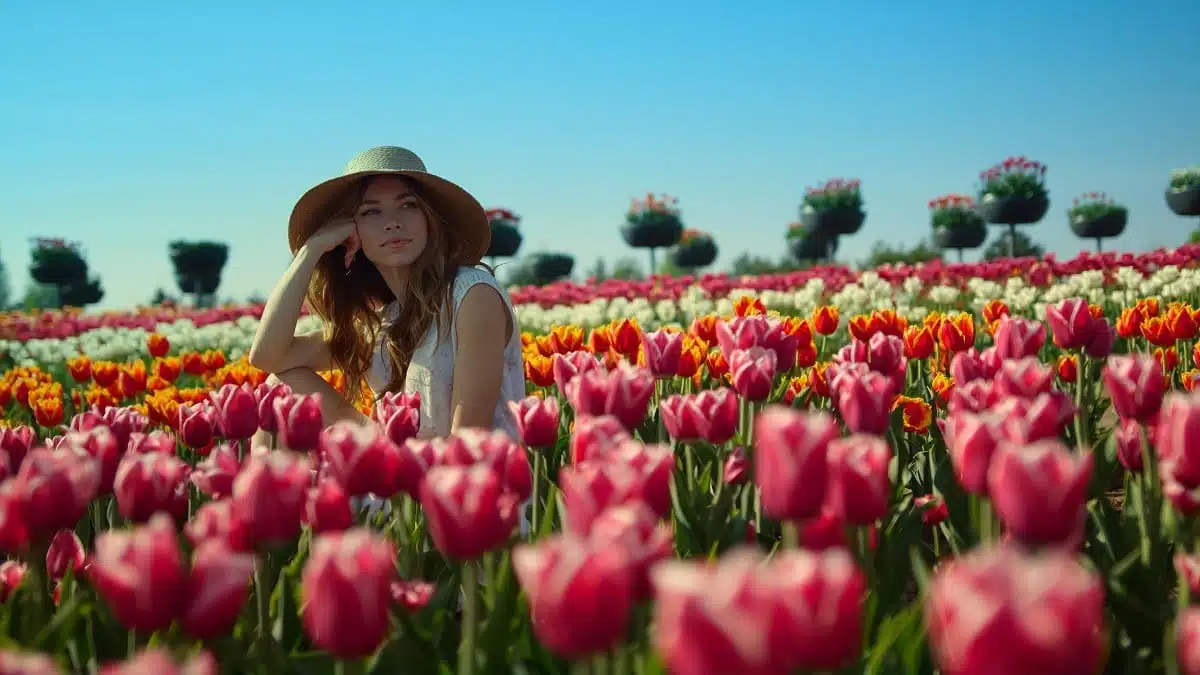
“Spring Song” by Paul Laurence Dunbar
A blue-bell springs upon the ledge,
A lark sits singing in the hedge;
Sweet perfumes scent the balmy air,
And life is brimming everywhere.
What lark and breeze and bluebird sing,
Is Spring, Spring, Spring!
No more the air is sharp and cold;
The planter wends across the wold,
And, glad, beneath the shining sky
We wander forth, my love and I.
And ever in our hearts doth ring
This song of Spring, Spring!
For life is life and love is love,
‘Twixt maid and man or dove and dove.
Life may be short, life may be long,
But love will come, and to its song
Shall this refrain for ever cling
Of Spring, Spring, Spring!
“Sonnet” by Alice Dunbar-Nelson
I had no thought of violets of late,
The wild, shy kind that spring beneath your feet
In wistful April days, when lovers mate
And wander through the fields in raptures sweet.
The thought of violets meant florists’ shops,
And bows and pins, and perfumed papers fine;
And garish lights, and mincing little fops
And cabarets and songs, and deadening wine.
So far from sweet real things my thoughts had strayed,
I had forgot wide fields, and clear brown streams
The perfect loveliness that God has made,—
Wild violets shy and Heaven-mounting dreams.
And now—unwittingly, you’ve made me dream
Of violets, and my soul’s forgotten gleam.
“Life and Art” by Aldous Huxley
You have sweet flowers for your pleasure;
You laugh with the bountiful earth
In its richness of summer treasure:
Where now are your flowers and your mirth?
Petals and cadenced laughter,
Each in a dying fall,
Droop out of life; and after
Is nothing; they were all.
But we from the death of roses
That three suns perfume and gild
With a kiss, till the fourth discloses
A withered wreath, have distilled
The fulness of one rare phial,
Whose nimble life shall outrun
The circling shadow on the dial,
Outlast the tyrannous sun.
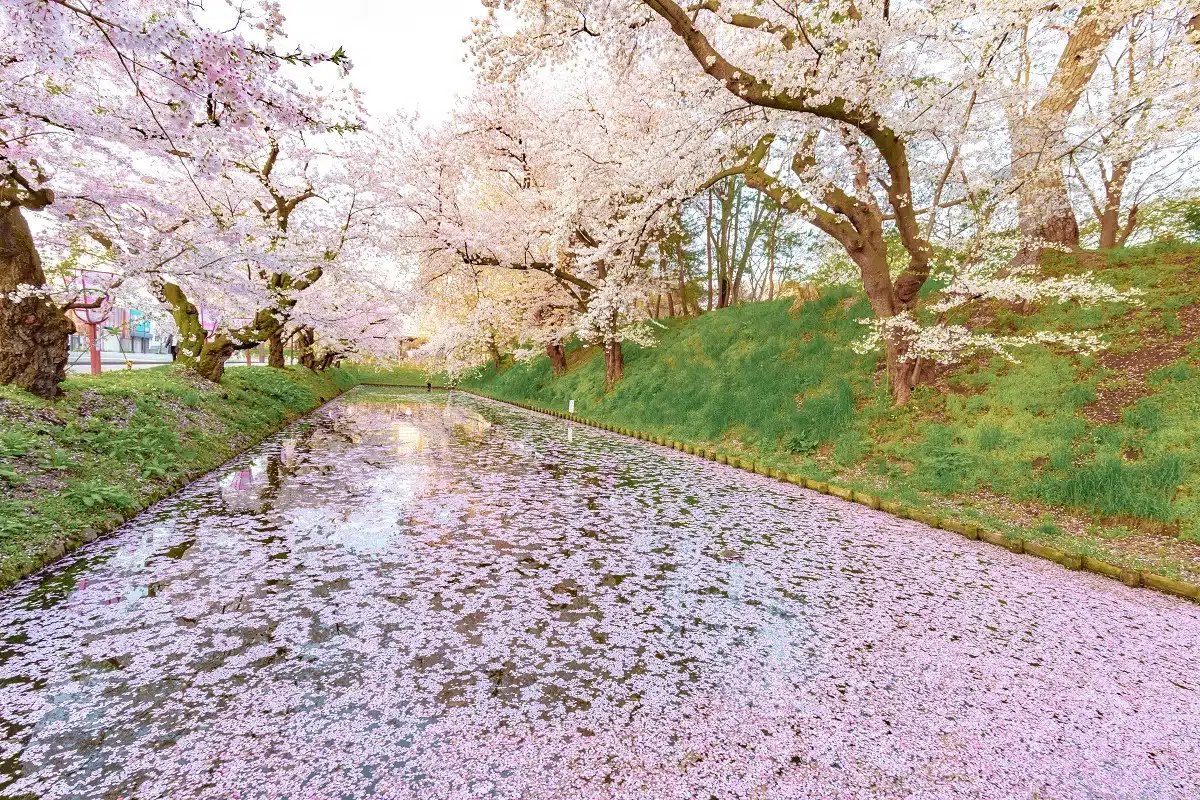
“Petals” by Amy Lowell
Life is a stream
On which we strew
Petal by petal the flower of our heart;
The end lost in dream,
They float past our view,
We only watch their glad, early start.
Freighted with hope,
Crimsoned with joy,
We scatter the leaves of our opening rose;
Their widening scope,
Their distant employ,
We never shall know. And the stream as it flows
Sweeps them away,
Each one is gone
Ever beyond into infinite ways.
We alone stay
While years hurry on,
The flower fared forth, though its fragrance still stays.
“The Yellow Violet” by William Cullen Bryant
When beechen buds begin to swell,
And woods the blue-bird’s warble know,
The yellow violet’s modest bell
Peeps from the last year’s leaves below.
Ere russet fields their green resume,
Sweet flower, I love, in forest bare,
To meet thee, when thy faint perfume
Alone is in the virgin air.
Of all her train, the hands of Spring
First plant thee in the watery mould,
And I have seen thee blossoming
Beside the snow-bank’s edges cold.
Thy parent sun, who bade thee view
Pale skies, and chilling moisture sip,
Has bathed thee in his own bright hue,
And streaked with jet thy glowing lip.
Yet slight thy form, and low thy seat,
And earthward bent thy gentle eye,
Unapt the passing view to meet,
When loftier flowers are flaunting nigh.
Oft, in the sunless April day,
Thy early smile has stayed my walk;
But midst the gorgeous blooms of May,
I passed thee on thy humble stalk.
So they, who climb to wealth, forget
The friends in darker fortunes tried.
I copied them—but I regret
That I should ape the ways of pride.
And when again the genial hour
Awakes the painted tribes of light,
I’ll not o’erlook the modest flower
That made the woods of April bright.
“Hora Stellatrix” by Amy Lowell
The stars hang thick in the apple tree,
The south wind smells of the pungent sea,
Gold tulip cups are heavy with dew.
The night’s for you, Sweetheart, for you!
Starfire rains from the vaulted blue.
Listen! The dancing of unseen leaves.
A drowsy swallow stirs in the eaves.
Only a maiden is sorrowing.
’T is night and spring, Sweetheart, and spring!
Starfire lights your heart’s blossoming.
In the intimate dark there’s never an ear,
Though the tulips stand on tiptoe to hear,
So give; ripe fruit must shrivel or fall.
As you are mine, Sweetheart, give all!
Starfire sparkles, your coronal.
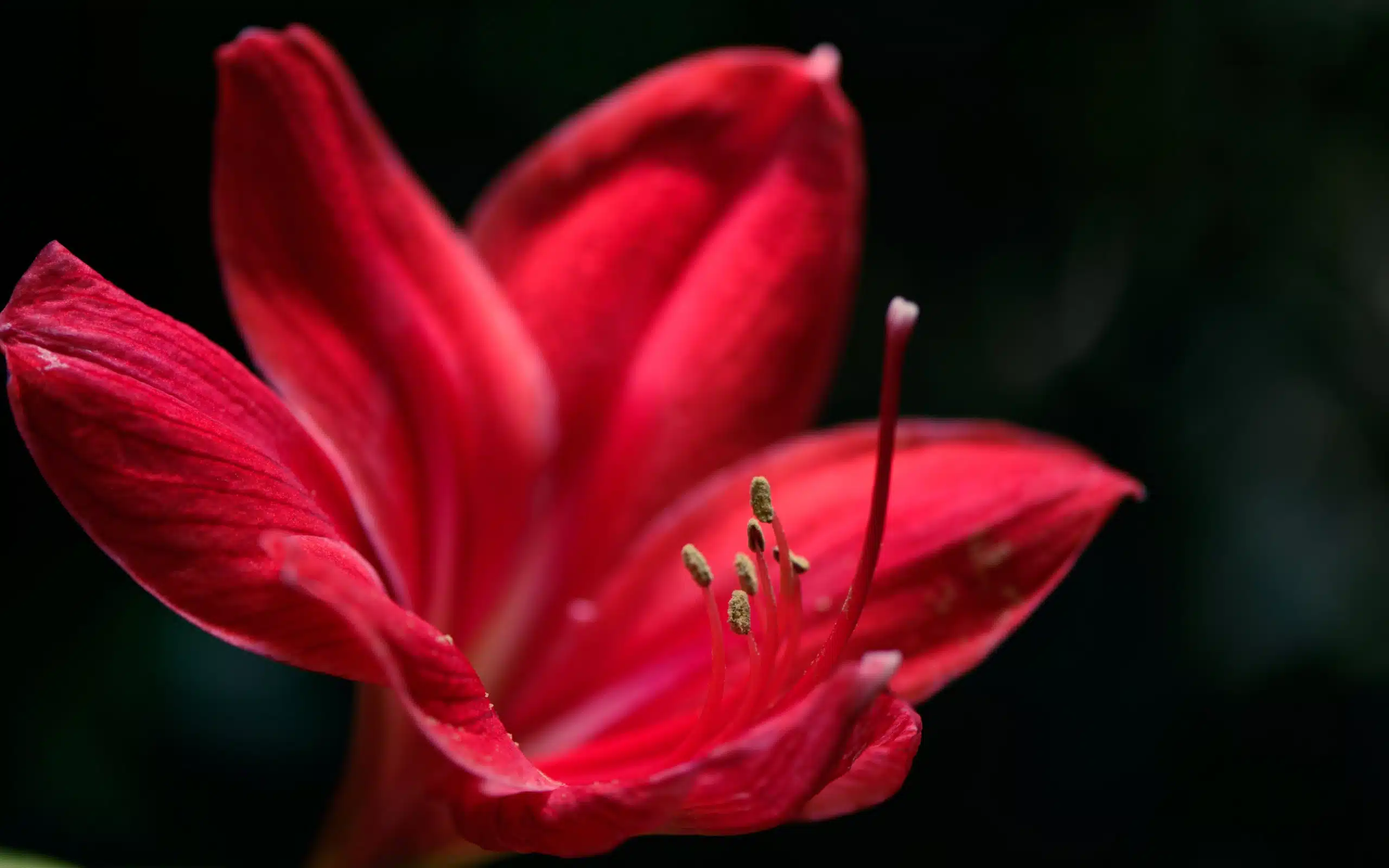
“A Fragment” by Adam Lindsay Gordon
They say that poison-sprinkled flowers
Are sweeter in perfume
Than when, untouched by deadly dew,
They glowed in early bloom.
They say that men condemned to die
Have quaffed the sweetened wine
With higher relish than the juice
Of the untampered vine.
They say that in the witch’s song,
Though rude and harsh it be,
There blends a wild, mysterious strain
Of weirdest melody.
And I believe the devil’s voice
Sinks deeper in our ear
Than any whisper sent from Heaven,
However sweet and clear.
“Weeds” by Edna St. Vincent Millay
White with daisies and red with sorrel
And empty, empty under the sky!—
Life is a quest and love a quarrel—
Here is a place for me to lie.
Daisies spring from damnèd seeds,
And this red fire that here I see
Is a worthless crop of crimson weeds,
Cursed by farmers thriftily.
But here, unhated for an hour,
The sorrel runs in ragged flame,
The daisy stands, a bastard flower,
Like flowers that bear an honest name.
And here a while, where no wind brings
The baying of a pack athirst,
May sleep the sleep of blessed things
The blood too bright, the brow accurst.
“Spring Song” by Hilda Conkling
I love daffodils.
I love Narcissus when he bends his head.
I can hardly keep March and spring and Sunday and daffodils
Out of my rhyme of song.
Do you know anything about the spring
When it comes again?
God knows about it while winter is lasting.
Flowers bring him power in the spring,
And birds bring it, and children.
He is sometimes sad and alone
Up there in the sky trying to keep his worlds happy.
I bring him songs
When he is in his sadness, and weary.
I tell him how I used to wander out
To study stars and the moon he made,
And flowers in the dark of the wood.
I keep reminding him about his flowers he has forgotten,
And that snowdrops are up.
What can I say to make him listen?
“God,” I say,
“Don’t you care!
Nobody must be sad or sorry
In the spring-time of flowers.”
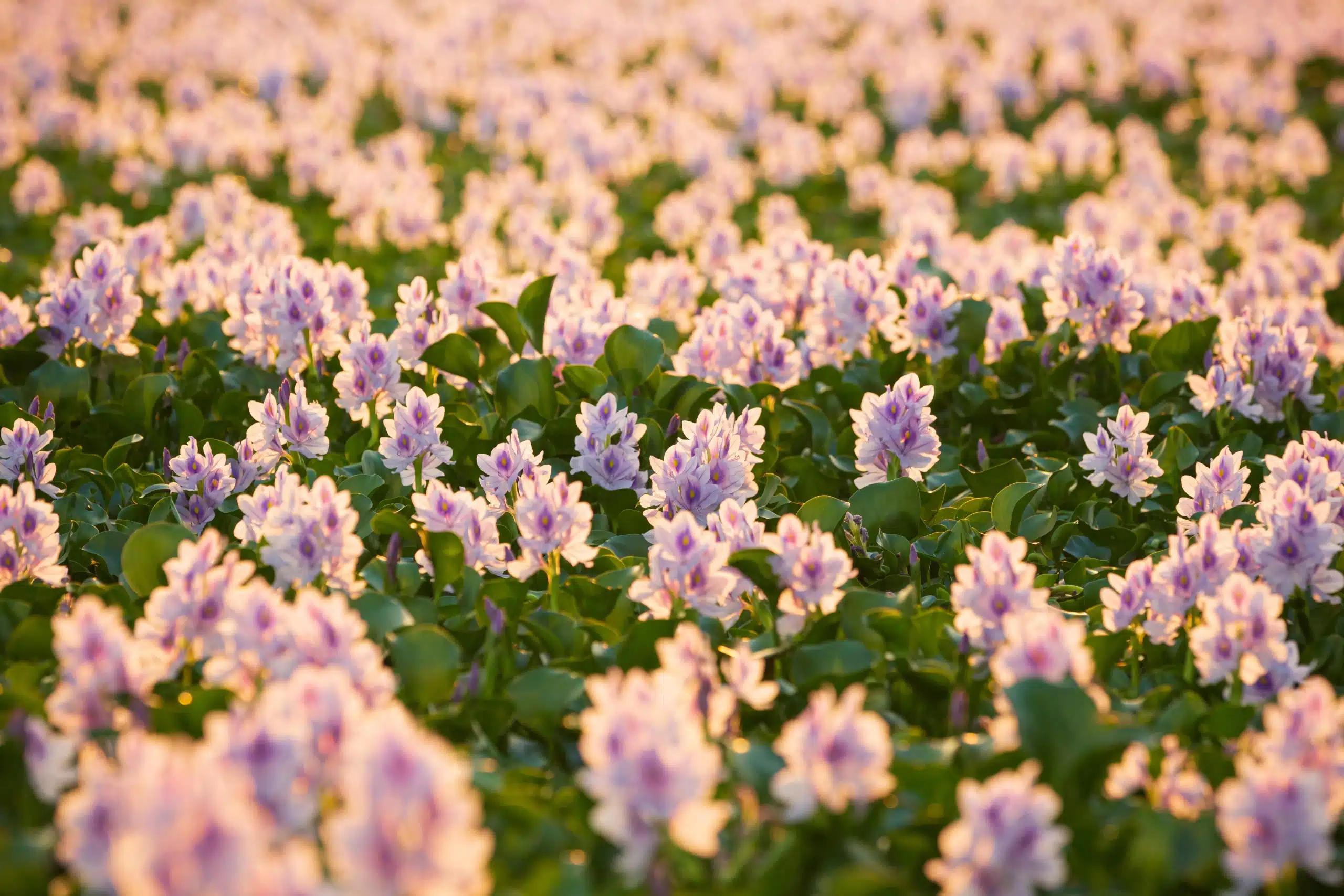
“The Shadow of a Flower” by Felicia Hemans
’Twas a dream of olden days
That Art, by some strange power,
The visionary form could raise
From the ashes of a flower.
That a shadow of the rose,
By its own meek beauty bow’d,
Might slowly, leaf by leaf, unclose,
Like pictures in a cloud.
Or the hyacinth, to grace,
As a second rainbow, spring;
Of summer’s path a dreary trace,
A fair, yet mournful thing!
For the glory of the bloom
That a flush around it shed,
And the soul within, the rich perfume,
Where were they? Fled, all fled!
Naught but the dim, faint line
To speak of vanish’d hours.—
Memory! what are joys of thine?
—Shadows of buried flowers!
“The Hours of Evening XII” by Émile Verhaeren (F. S. Flint, Translator)
Dainty flowers, like a froth of foam, grew along the borders of our paths; the wind fell and the air seemed to brush your hands and hair with plumes.
The shade was kindly to us as we walked in step beneath the leafage; a child’s song reached us from a village, and filled all the infinite.
Our ponds were outspread in their autumn splendour under the guard of the long reeds, and the lofty, swaying crown on the woods’ fine brow was mirrored in the waters.
And both knowing that our hearts were brooding together on the same thought, we reflected that it was our calmed life that was revealed to us in this lovely evening.
For one supreme moment, you saw the festival sky deck itself out and say farewell to us; and for a long, long while you gave it your eyes filled to the brim with mute caresses.
“Ye Are Not Miss’d Fair Flowers!” by Felicia Hemans
Ye are not miss’d, fair flowers, that late were spreading
The summer’s glow by fount and breezy grot;
There falls the dew, its fairy favours shedding—
The leaves dance on, the young birds miss you not.
Still plays the sparkle o’er the rippling water,
O lily! whence thy cup of pearl is gone;
The bright wave mourns not for its loveliest daughter,
There is no sorrow in the wind’s low tone.
And thou, meek hyacinth! afar is roving
The bee that oft thy trembling bells hath kiss’d.
Cradled ye were, fair flowers! ’midst all things loving,
A joy to all—yet, yet, ye are not miss’d!
Ye, that were born to lend the sunbeam gladness,
And the winds fragrance, wandering where they list,
Oh! it were breathing words too deep in sadness,
To say earth’s human flowers not more are miss’d.
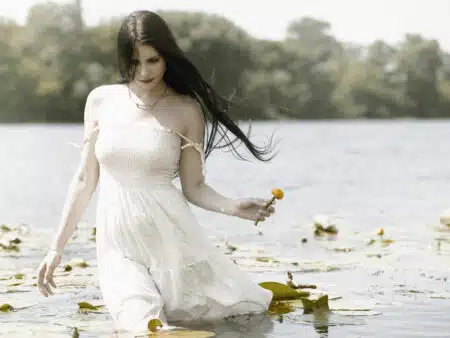
“Flowers” by Mary Baker Eddy
Mirrors of morn
Whence the dewdrop is born,
Soft tints of the rainbow and skies—
Sisters of song,
What a shadowy throng
Around you in memory rise!
Far do ye flee,
From your green bowers free,
Fair floral apostles of love,
Sweetly to shed
Fragrance fresh round the dead,
And breath of the living above.
Flowers for the brave—
Be he monarch or slave,
Whose heart bore its grief and is still!
Flowers for the kind—
Aye, the Christians who wind
Wreaths for the triumphs o’er ill!
“The Present and the Time to Come” by Miss M. A. Browne
The time when I play’d with the king-cup flowers—
Those golden gifts of summer hours;
The time when I danced o’er the purple heath,
And scarcely felt the earth beneath;
And smilingly look’d to the sky above,
That spread o’er me in cloudless love;
When my step was as light as the roving wind,
That kiss’d the flowers in my tresses twined ;
When my eyes, undimmed by a dark tear, shone:—
That blessed time is gone,—is gone.
The time when I loved to sit at noon,
And hearken to the woodbird’s tune:
When the flowers, and leaves upon each tree
Were more than flowers and leaves to me;
When my spirit in fancy floated along,
And around my heart was a dream of song;
The time when I lay by the river’s side,
That had words for me in its murmuring tide;
When my life, like the waves of that stream, went on,
Bright, pure, and sparkling, —is gone, —is gone.
And the hours of darkness and days of gloom,
That shadow and shut out joy, are come:
And there’s a mist on the laughing sea,
And the flowers and leaves are nought to me;
And on my brow are furrows left,
And my lip of rose and smile is reft,
And the time of gray hairs and trembling limbs,
And the time when sorrowthe bright eye dims,
And the time when death seems nought to fear;
So sad a life—is here, —is here.
But the time when the quiet grave shall be
A haven, a resting- place for me,
When the strong ties of earth are wrenched,
And the burning fever of life is quenched ,
When the spirit shall leave its mortal mould,
And face to face its God behold,
When around it joy and gladness shall flow,
Purer than ever it felt below,
When heaven shall be for ever its home,—
Oh! this holiest time is still to come!
Sad Poems About Flowers
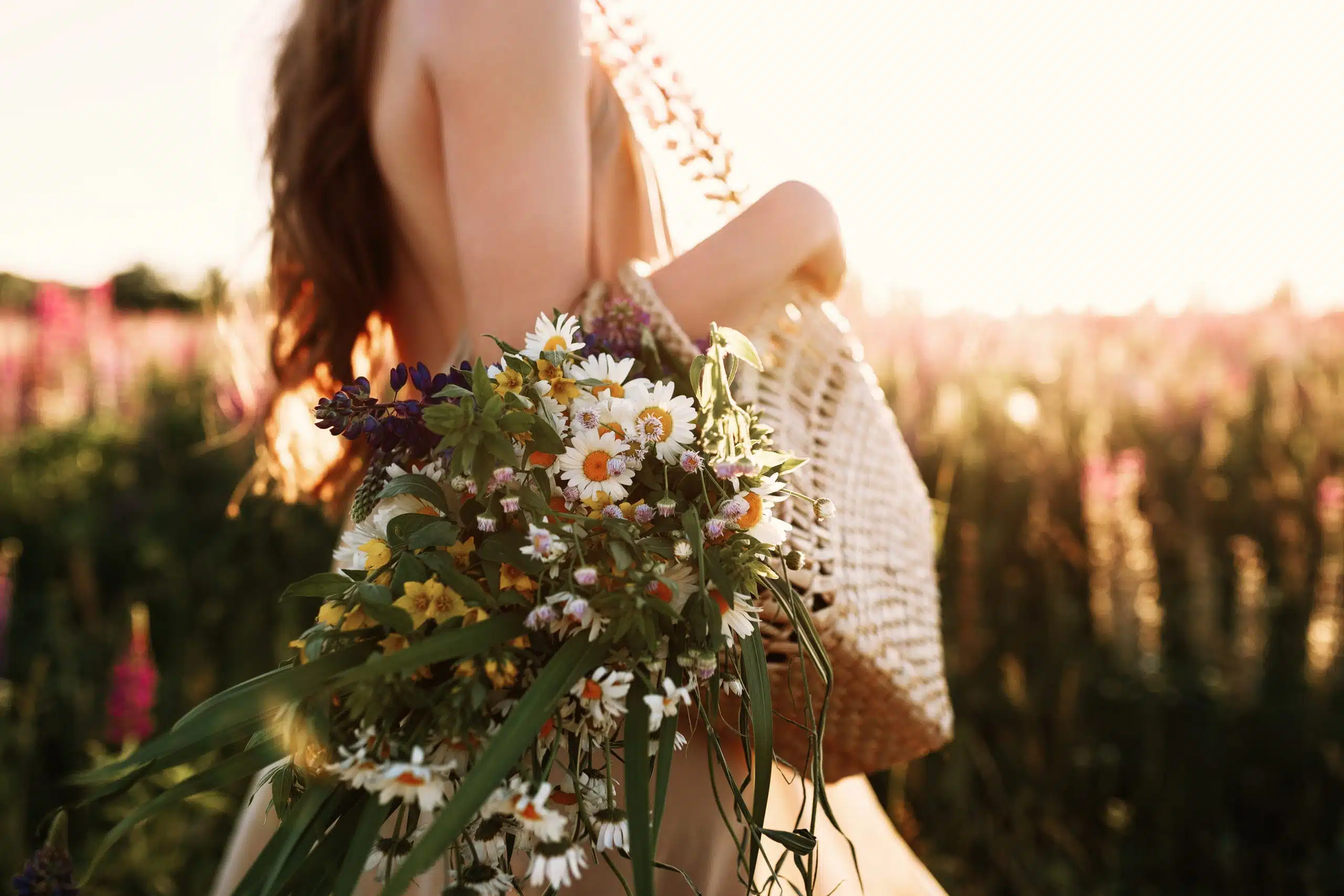
“The Last Rose of Summer” by Thomas Moore
‘Tis the last rose of Summer,
Left blooming alone;
All her lovely companions
Are faded and gone;
No flower of her kindred,
No rose-bud is nigh,
To reflect back her blushes
Or give sigh for sigh!
I’ll not leave thee, thou lone one,
To pine on the stem;
Since the lovely are sleeping,
Go sleep thou with them.
Thus kindly I scatter
Thy leaves o’er the bed
Where thy mates of the garden
Lie scentless and dead.
So soon may I follow,
When friendships decay,
And from Love’s shining circle
The gems drop away!
When true hearts lie withered,
And fond ones are flown,
Oh! who would inhabit
This bleak world alone?
“Heart Yearnings” by George Marion McClellan
Oh! for the welcome breath of country air,
With Summer skies and flowers,
To shout and feel once more the halcyon
Of gayer boyhood hours.
I think the sight of fields and shady lanes
Would ease my heart of pains.
To cool once more my thirst, where bubbled up
The waters of a spring,
Where I have seen the golden daffodils
And lillies flourishing,
My fevered heart would more than half forget
Its sighs, and vain regret.
Far, far away, from early scenes am I;
And, too, my youth has fled;
For me a stranger’s land, a stranger’s sky,
That arches overhead.
For scenes and joys that now have passed me by,
I can but give a sigh.
“Night” by H. D.
The night has cut
each from each
and curled the petals
back from the stalk
and under it in crisp rows;
under at an unfaltering pace,
under till the rinds break,
back till each bent leaf
is parted from its stalk;
under at a grave pace,
under till the leaves
are bent back
till they drop upon earth,
back till they are all broken.
O night,
you take the petals
of the roses in your hand,
but leave the stark core
of the rose
to perish on the branch.

“One Foot on Sea, and One on Shore” by Christina Rossetti
“Oh tell me once and tell me twice
And tell me thrice to make it plain,
When we who part this weary day,
When we who part shall meet again.”
“When windflowers blossom on the sea
And fishes skim along the plain,
Then we who part this weary day,
Then you and I shall meet again.”
“Yet tell me once before we part,
Why need we part who part in pain?
If flowers must blossom on the sea,
Why, we shall never meet again.
“My cheeks are paler than a rose,
My tears are salter than the main,
My heart is like a lump of ice
If we must never meet again.”
“Oh weep or laugh, but let me be,
And live or die, for all’s in vain;
For life’s in vain since we must part,
And parting must not meet again
“Till windflowers blossom on the sea,
And fishes skim along the plain;
Pale rose of roses let me be,
Your breaking heart breaks mine again.”
“The Floweret” by Alexander Pushkin (Ivan Panin, Translator)
A floweret, withered, odorless
In a book forgot I find;
And already strange reflection
Cometh into my mind.
Bloomed, where? when? In what spring?
And how long ago? And plucked by whom?
Was it by a strange hand? Was it by a dear hand?
And wherefore left thus here?
Was it in memory of a tender meeting?
Was it in memory of a fated parting?
Was it in memory of a lonely walk?
In the peaceful fields or in the shady woods?
Lives he still? Lives she still?
And where their nook this very day?
Or are they too withered
Like unto this unknown floweret?
“The Flower of the Desert” by Felicia Hemans
Why art thou thus in thy beauty cast,
O lonely, loneliest flower!
Where the sound of song hath never pass’d
From human hearth or bower?
I pity thee, for thy heart of love,
For that glowing heart, that fain
Would breathe out joy with each wind to rove—
In vain, lost thing! in vain!
I pity thee, for thy wasted bloom,
For thy glory’s fleeting hour,
For the desert place, thy living tomb—
O lonely, loneliest flower!
I said—but a low voice made reply,
“Lament not for the flower!
Though its blossoms all unmark’d must die,
They have had a glorious dower.
“Though it bloom afar from the minstrel’s way,
And the paths where lovers tread;
Yet strength and hope, like an inborn day,
By its odours have been shed.
“Yes! dews more sweet than ever fell
O’er island of the blest,
Were shaken forth, from its purple bell,
On a suffering human breast.
“A wanderer came, as a stricken deer,
O’er the waste of burning sand,
He bore the wound of an Arab spear,
He fled from a ruthless band.
“And dreams of home in a troubled tide
Swept o’er his darkening eye,
As he lay down by the fountain-side,
In his mute despair to die.
“But his glance was caught by the desert’s flower,
The precious boon of heaven;
And sudden hope, like a vernal shower,
To his fainting heart was given.
“For the bright flower spoke of One above—
Of the presence felt to brood,
With a spirit of pervading love,
O’er the wildest solitude.
“Oh! the seed was thrown those wastes among
In a bless’d and gracious hour,
For the lorn one rose in heart made strong
By the lonely, loneliest flower!”
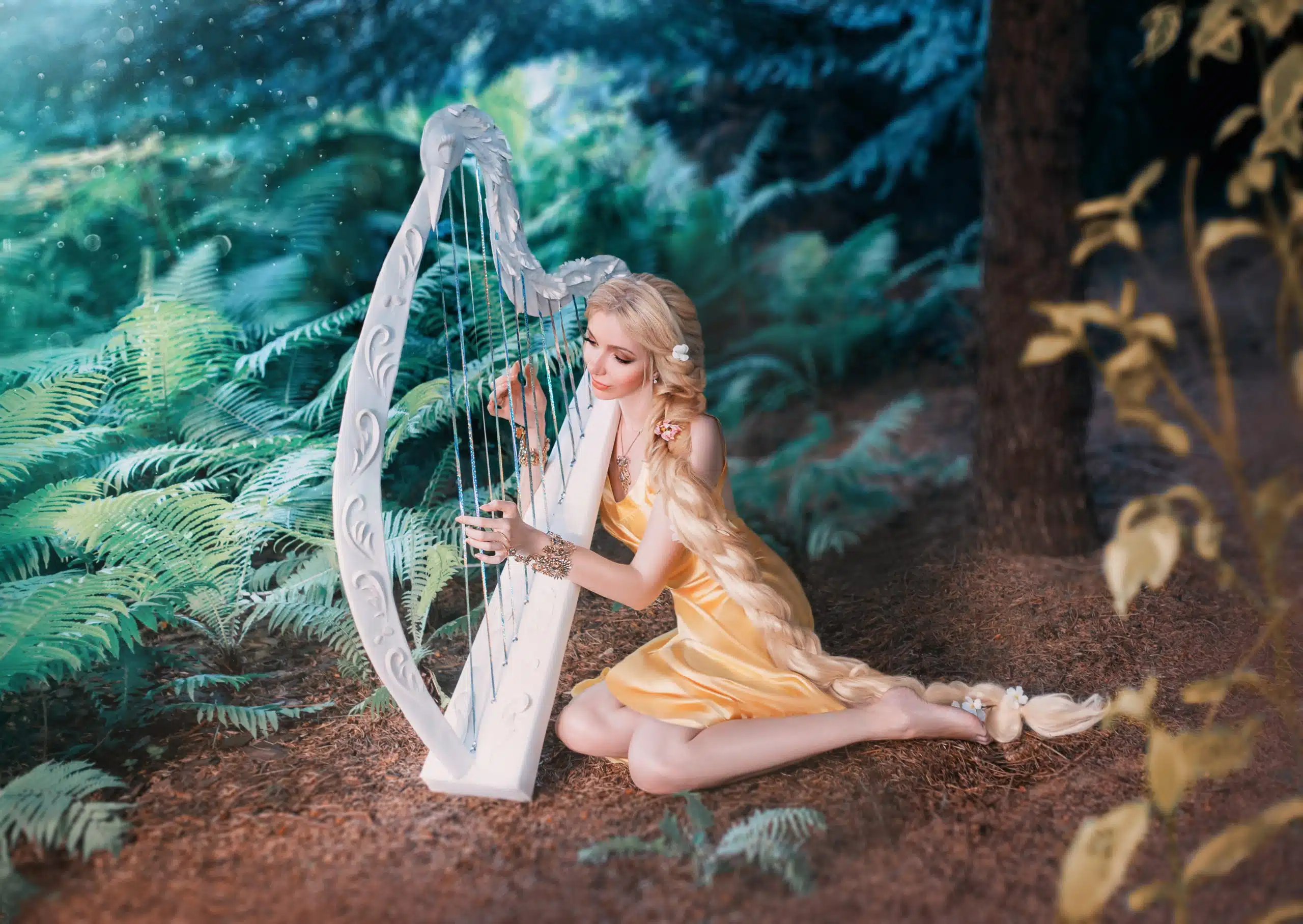
“The Lyre and Flower” by Felicia Hemans
A lyre its plaintive sweetness pour’d
Forth on the wild wind’s track;
The stormy wanderer jarr’d the chord,
But gave no music back.—
O child of song!
Bear hence to heaven thy fire:
What hopest thou from the reckless throng?
Be not like that lost lyre!
Not like that lyre!
A flower its leaves and odours cast
On a swift-rolling wave;
Th’ unheeding torrent darkly pass’d,
And back no treasure gave.—
O heart of love!
Waste not thy precious dower:
Turn to thine only home above!
Be not like that lost flower!
Not like that flower!
“May to April” by Philip Freneau
Without your showers, I breed no flowers,
Each field a barren waste appears;
If you don’t weep, my blossoms sleep,
They take such pleasures in your tears.
As your decay made room for May,
So I must part with all that’s mine:
My balmy breeze, my blooming trees
To torrid suns their sweets resign!
O’er April dead, my shades I spread:
To her I owe my dress so gay—
Of daughters three, it falls on me
To close our triumphs on one day:
Thus, to repose, all Nature goes;
Month after month must find its doom:
Time on the wing, May ends the Spring,
And Summer dances on her tomb!
“In Flanders Fields” by John McCrae
In Flanders fields the poppies blow
Between the crosses, row on row,
That mark our place; and in the sky
The larks, still bravely singing, fly
Scarce heard amid the guns below.
We are the Dead. Short days ago
We lived, felt dawn, saw sunset glow,
Loved and were loved, and now we lie
In Flanders fields.
Take up our quarrel with the foe:
To you from failing hands we throw
The torch; be yours to hold it high.
If ye break faith with us who die
We shall not sleep, though poppies grow
In Flanders fields.
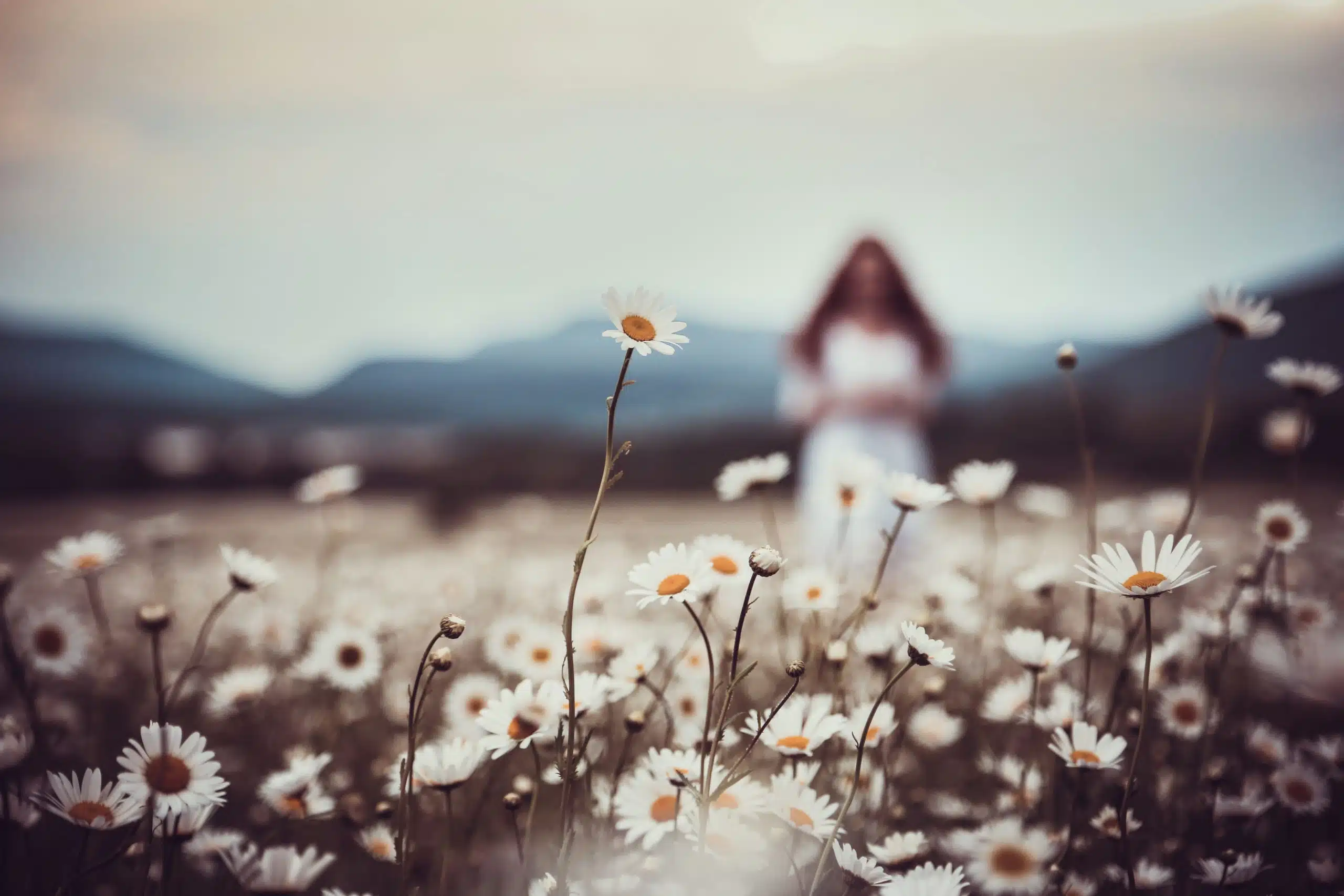
“Apparition” by Stéphane Mallarmé, trans. by Wilfrid Thorley
The moon grew sad, and weeping seraphim,
Musing among the vaporous flowers aswim,
With slow bows from the sobbing viols drew
White tears that sank in their corónals blue.
It was the blesséd day of your first kiss.
My reverie, eager with new miseries,
Was all a-swoon with perfume of shy grief
That leaves the heart to gather its own sheaf,
And frets not, nor yet sickens of its prize.
I wandered, and the worn way held my eyes
When in the street I saw your sun-girt hair
And you all smiling in the twilit air.
I took you for that elf who, crowned with beams,
Once passed before me in my childish dreams,
And shed white posies of sweet-smelling flow’rs
Star-like for tiny hands in snowy show’rs.
“Fulfilment” by Paul Laurence Dunbar
I grew a rose once more to please mine eyes.
All things to aid it—dew, sun, wind, fair skies—
Were kindly; and to shield it from despoil,
I fenced it safely in with grateful toil.
No other hand than mine shall pluck this flower, said I,
And I was jealous of the bee that hovered nigh.
It grew for days; I stood hour after hour
To watch the slow unfolding of the flower,
And then I did not leave its side at all,
Lest some mischance my flower should befall.
At last, oh joy! the central petals burst apart.
It blossomed—but, alas! a worm was at its heart!
“Promise” by Paul Laurence Dunbar
I grew a rose within a garden fair,
And, tending it with more than loving care,
I thought how, with the glory of its bloom,
I should the darkness of my life illume;
And, watching, ever smiled to see the lusty bud
Drink freely in the summer sun to tinct its blood.
My rose began to open, and its hue
Was sweet to me as to it sun and dew;
I watched it taking on its ruddy flame
Until the day of perfect blooming came,
Then hasted I with smiles to find it blushing red —
Too late! Some thoughtless child had plucked my rose and fled!
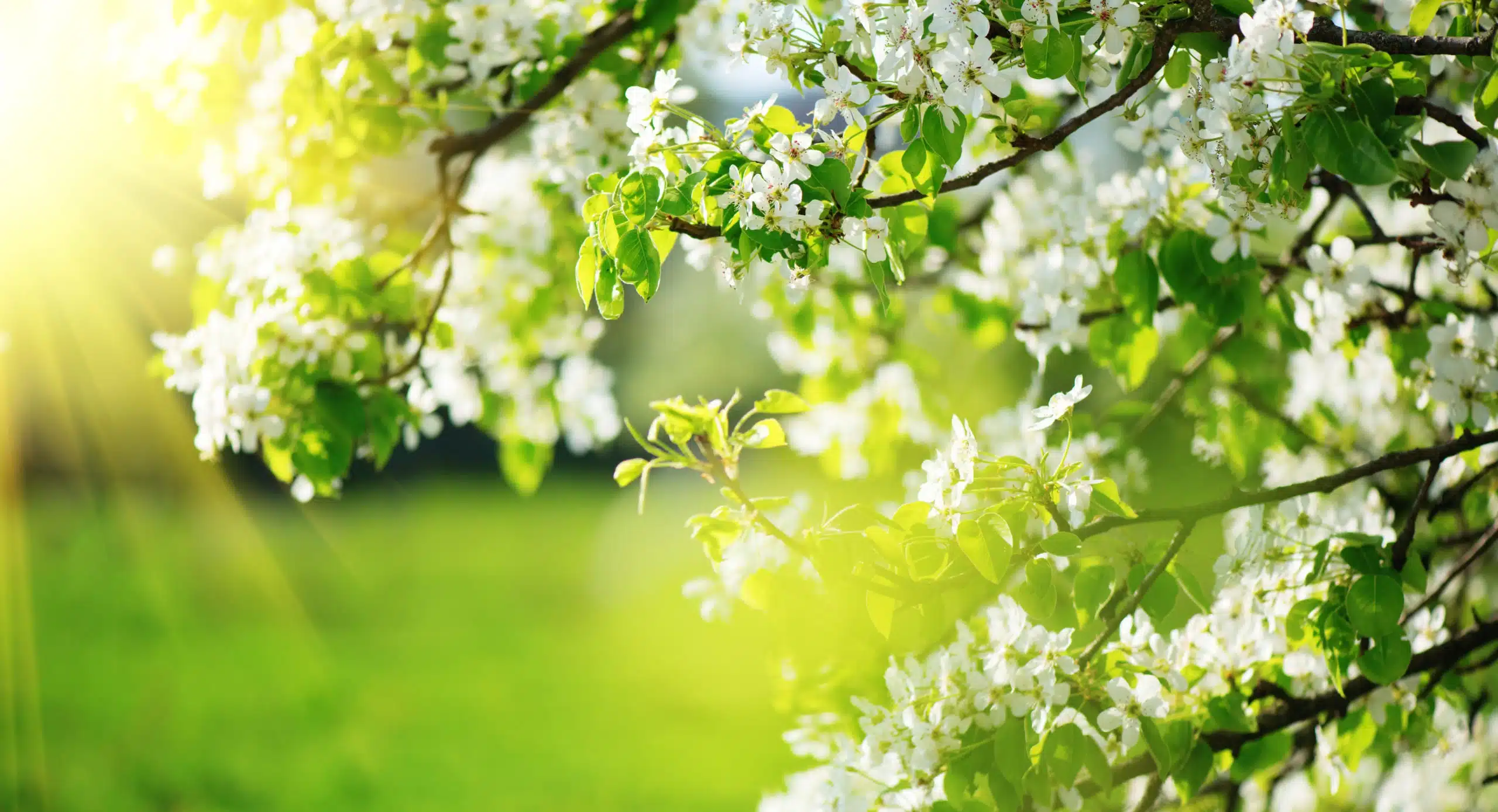
“Only a Fragrant Spray” by Unknown (Charles Budd, Translator)
Ah me, the day you left me
Was full of weary hours;
But the tree ‘neath which we parted
Was rich with leaves and flowers.
And from its fragrant branches
I plucked a tiny spray,
And hid it in my bosom
In memory of that day.
I know the endless distance
Must shut you from my view,
But the flower’s gentle fragrance
Brings sweetest thoughts of you.
And, though it’s but a trifle,
Which none would prize for gain,
It oft renews our parting,
With all the love and pain.
“A November Daisy” by Henry van Dyke
Afterthought of summer’s bloom!
Late arrival at the feast,
Coming when the songs have ceased
And the merry guests departed,
Leaving but an empty room,
Silence, solitude, and gloom,—
Are you lonely, heavy-hearted;
You, the last of all your kind,
Nodding in the autumn-wind;
Now that all your friends are flown,
Blooming late and all alone?
Nay, I wrong you, little flower,
Reading mournful mood of mine
In your looks, that give no sign
Of a spirit dark and cheerless!
You possess the heavenly power
That rejoices in the hour.
Glad, contented, free, and fearless,
Lift a sunny face to heaven
When a sunny day is given!
Make a summer of your own,
Blooming late and all alone!
Once the daisies gold and white
Sea-like through the meadow rolled:
Once my heart could hardly hold
All its pleasures. I remember,
In the flood of youth’s delight
Separate joys were lost to sight.
That was summer! Now November
Sets the perfect flower apart;
Gives each blossom of the heart
Meaning, beauty, grace unknown,—
Blooming late and all alone.
“The Death of Flowers” by Miss Bowles
How happily, how happily the flowers die away!
Oh, could we but return to earth as easily as they!
Just live a life of sunshine, of innocence, and bloom,
Then drop without decrepitude, or pain, into the tomb.
The gay and glorious creatures! they neither ” toil nor spin,”
Yet, lo! what goodly raiment they are all apparelled in;
No tears are on their beauty, but dewy gems more bright
Than ever brow of eastern queen endiademed with light.
The young rejoicing creatures! their pleasures never pall;
Nor lose in sweet contentment, because so free to all!
The dew, the showers, the sunshine, the balmy, blessed
air,
Spend nothing of their freshness, though all may freely share.
The happy, careless creatures ! of time they take no heed;
Nor weary of his creeping, nor tremble at his speed;
Nor sigh with sick impatience, and wish the light away;
Nor when ‘ tis gone, cry dolefully, “Would God, that it
were day!”
And when their lives are over, they drop away to rest,
Unconscious of the final doom, on Nature’s holy breast;
No pain have they in dying-no shrinking from decay,-
Oh, could we but return to earth as easily as they!
